Product Description
| No. | Item | Specifications |
| 1 | Materials | Carbon steel: 10#, 18#, 1018, 22#, 1571, 40Cr, 45#, 1045, 50#, 55#, 60#, 65Mn, 70#, 72B, 80#, 82B Alloy Structure Steel: B7, 20CrMo, 42Crmo, SCM415, SCM440, 4140 High-carbon chromium bearing steel: GCr15, 52100, SUJ2 Free-cutting steel: 12L14, 12L15 Stainless steel: 1Cr13, 2Cr13, 3Cr13, 4Cr13, 1Cr17, SUS410, SUS420, SUS430, SUS416, SUS440C, 17-4, 17-4PH, 130M, 200, 201, 202, 205, 303, 303Cu, 304, 316, 316L Aluminum grade: 6061, 6063 Brass: Hpb58-2.5 (C38000), Hpb59-1 (C37710), Hpb61-1 (C37100), Hpb62-0.8 (C35000), Hpb63-0.1 (C34900), Hpb63-3 (C34500), H60, H62, H63, H65 |
| 2 | Diameter | Ø0.3-Ø25 |
| 3 | Diameter tolerance | 0.002mm |
| 4 | Roundness | 0.0005mm |
| 5 | Roughness | Ra0.05 |
| 6 | Straightness | 0.005mm |
| 7 | Hardness: | HRC/HV |
| 8 | Length | 2mm-1000mm |
| 9 | Heat treatment | 1. Oil Quenching 2. High frequency quenching 3. Carburization 4. Vacuum Heat treatment 5. Mesh belt CZPT heat treatment |
| 10 | Surface treatment | 1. Plating nickel 2. Plating zinc 3. Plating passivation 4. Plating phosphating 5. Black coating 6. Anodized treatment |
| 11 | Packing | Plastic bags inside and standard cartons outside. Shipment by pallets or according to customer’s packing specifications. |
Q: How can I get samples?
A: Free samples and freight collect, except for special circumstances.
Q: What is your minimum order quantity for the items in the order?
A: 2000pcs for each part except for sample.
Q: Are you a trading company or a manufacturer?
A: We are a manufacturer, specialized in manufacturing and exporting of qualified precision micro shafts.
Q: What are your usual terms of payment?
A: We generally ask for payment by T/T in advance and L/C at sight.
/* January 22, 2571 19:08:37 */!function(){function s(e,r){var a,o={};try{e&&e.split(“,”).forEach(function(e,t){e&&(a=e.match(/(.*?):(.*)$/))&&1
| Condition: | New |
|---|---|
| Axle Number: | 2 |
| Application: | Car |
| Certification: | ISO, IATF |
| Material: | Stainless Steel |
| Type: | Auto Shaft |
| Samples: |
US$ 4/Piece
1 Piece(Min.Order) | |
|---|
| Customization: |
Available
| Customized Request |
|---|
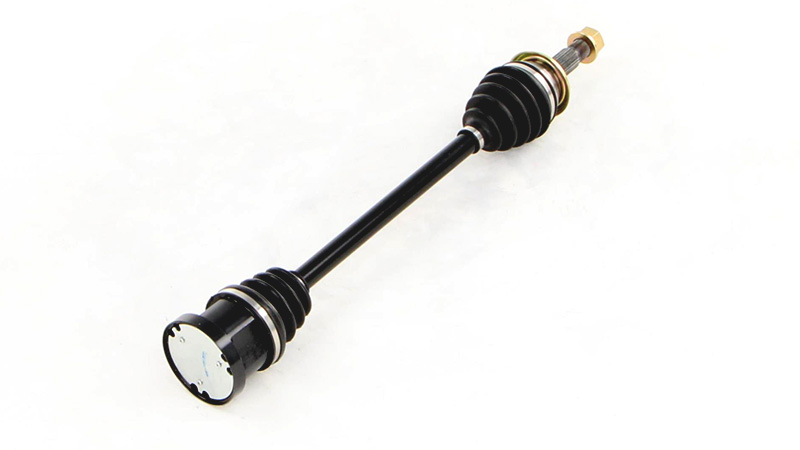
Can you provide insights into the maintenance of axle bearings for smooth operation?
Maintaining axle bearings is essential for ensuring smooth operation, longevity, and optimal performance of a vehicle’s axle system. Here are some insights into the maintenance of axle bearings:
1. Regular Inspection:
Perform regular visual inspections of the axle bearings to check for any signs of wear, damage, or leaks. Look for indications such as excessive play, unusual noises, vibration, or leakage of grease. Inspections should be carried out as per the manufacturer’s recommended intervals or during routine maintenance checks.
2. Lubrication:
Adequate lubrication is crucial for the smooth operation of axle bearings. Follow the manufacturer’s guidelines for the type of lubricant to use and the recommended intervals for greasing. Over-greasing or under-greasing can lead to bearing damage or failure. Ensure that the proper amount of grease is applied to the bearings, and use a high-quality grease that is compatible with the axle bearing specifications.
3. Seal Inspection and Replacement:
Check the condition of the axle bearing seals regularly. The seals help to keep contaminants out and retain the lubricating grease within the bearing. If the seals are damaged, worn, or show signs of leakage, they should be replaced promptly to prevent dirt, water, or debris from entering the bearing assembly and causing damage.
4. Proper Installation:
During axle bearing replacement or installation, it is crucial to follow proper procedures to ensure correct seating and alignment. Improper installation can lead to premature bearing failure and other issues. Refer to the manufacturer’s instructions or consult a professional mechanic to ensure proper installation techniques are followed.
5. Load Capacity and Alignment:
Ensure that the axle bearings are properly sized and rated to handle the load capacity of the vehicle and the specific application. Overloading the bearings can lead to excessive wear and premature failure. Additionally, proper wheel alignment is important to prevent uneven bearing wear. Regularly check and adjust the wheel alignment if necessary.
6. Environmental Considerations:
Take into account the operating conditions and environment in which the vehicle is used. Extreme temperatures, exposure to water, dirt, or corrosive substances can affect the performance of axle bearings. In such cases, additional preventive measures may be necessary, such as more frequent inspections, cleaning, and lubrication.
7. Professional Maintenance:
If you are unsure about performing maintenance on axle bearings yourself or if you encounter complex issues, it is recommended to seek assistance from a qualified mechanic or technician who has experience with axle systems. They can provide expert advice, perform necessary repairs or replacements, and ensure proper maintenance of the axle bearings.
By following these maintenance insights, you can help ensure the smooth operation, longevity, and reliability of axle bearings, contributing to the overall performance and safety of the vehicle.
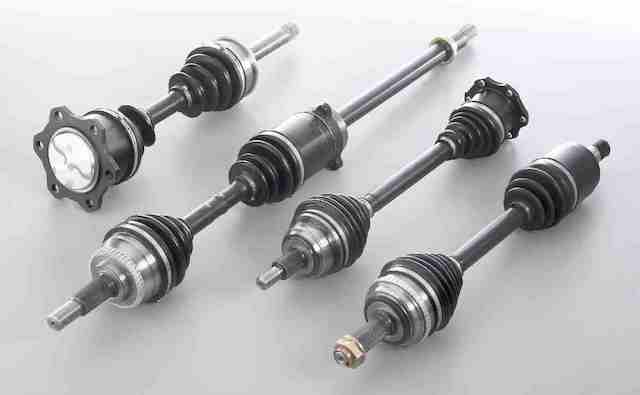
Where can I purchase high-quality replacement axles for my make and model of vehicle?
When it comes to purchasing high-quality replacement axles for your specific make and model of vehicle, there are several reliable sources you can consider. Here are some options:
- Authorized Dealerships:
- Independent Auto Parts Stores:
- Online Retailers:
- Specialty Performance Retailers:
- Local Salvage Yards:
- Vehicle Manufacturer’s Online Parts Store:
Authorized dealerships of your vehicle’s manufacturer are a trustworthy option for purchasing replacement axles. They offer genuine parts that are specifically designed and engineered for your make and model. Contact your local dealership’s parts department to inquire about the availability of replacement axles.
Independent auto parts stores often carry a wide range of replacement axles from reputable manufacturers. These stores typically have knowledgeable staff who can help you identify the correct axle for your vehicle. Examples of popular auto parts stores include AutoZone, Advance Auto Parts, and O’Reilly Auto Parts.
Online retailers provide a convenient way to browse and purchase replacement axles from the comfort of your home. Websites such as Amazon, eBay, and RockAuto offer extensive selections of axles for various vehicle makes and models. Be sure to verify the compatibility of the axles with your specific vehicle before making a purchase.
If you are looking for high-performance or upgraded axles, specialty performance retailers may be the way to go. These retailers cater to enthusiasts and offer axles that are designed to handle increased power, torque, or off-road demands. Examples of specialty performance retailers include Summit Racing, Jegs, and 4 Wheel Parts.
Salvage yards, also known as junkyards or auto recyclers, can be a cost-effective option for finding used axles in good condition. Some salvage yards have an inventory system that allows you to search for specific parts based on your vehicle’s make and model. It’s important to thoroughly inspect used axles before purchase to ensure they meet your requirements.
Many vehicle manufacturers have their own online parts stores where you can directly purchase genuine replacement parts, including axles. These online stores provide the assurance of authenticity and compatibility with your specific make and model. Visit the official website of your vehicle’s manufacturer and look for their parts store section.
When purchasing replacement axles, it’s important to prioritize quality and ensure that the parts meet or exceed the original equipment specifications. Consider factors such as warranty coverage, customer reviews, and the reputation of the manufacturer or retailer. Additionally, consult with knowledgeable professionals or refer to your vehicle’s owner’s manual for specific axle specifications and recommendations.
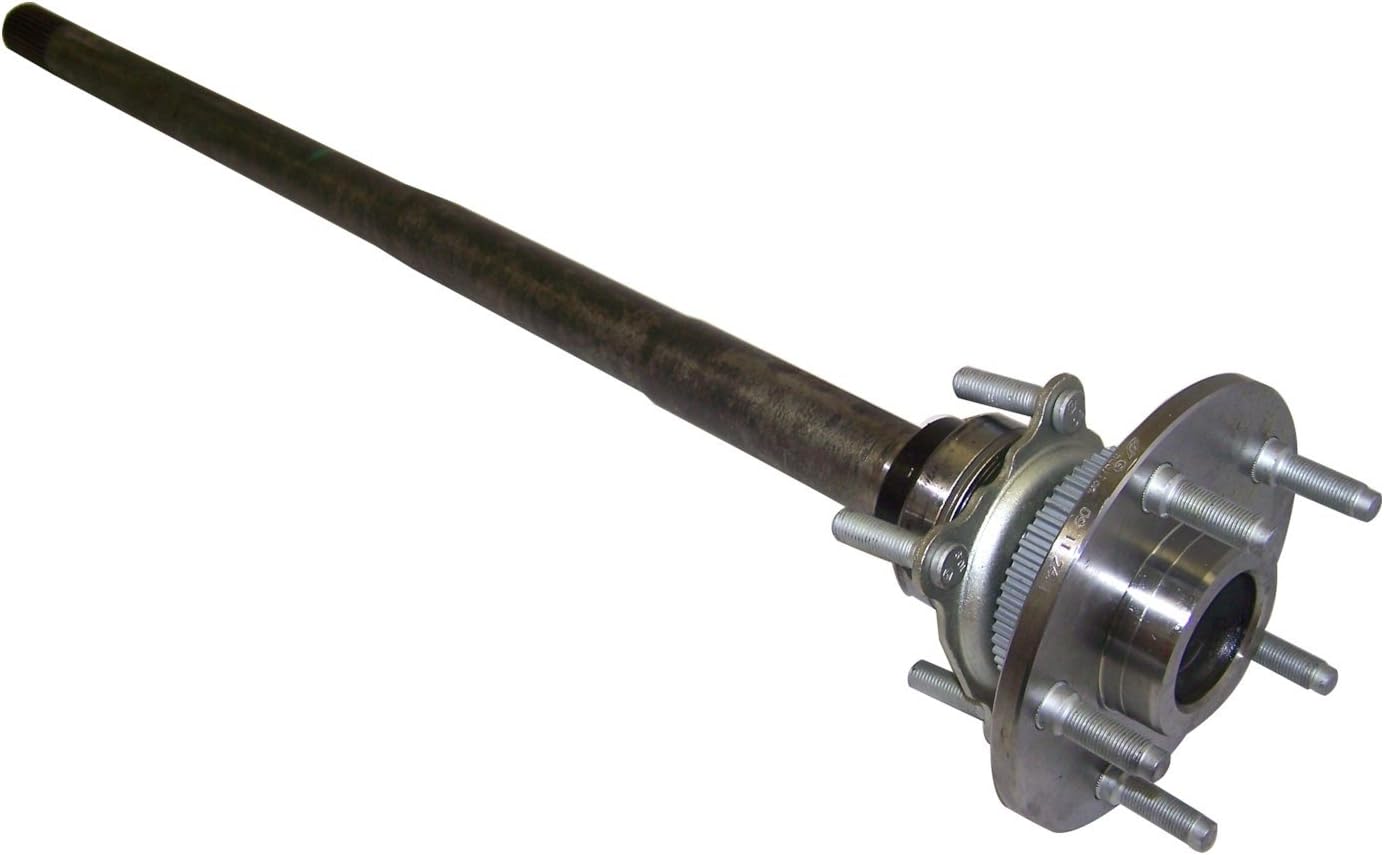
How do solid axles differ from independent axles in terms of performance?
When comparing solid axles and independent axles in terms of performance, there are several key differences to consider. Both types of axles have their advantages and disadvantages, and their suitability depends on the specific application and desired performance characteristics. Here’s a comparison of solid axles and independent axles:
| Aspect | Solid Axles | Independent Axles |
|---|---|---|
| Load-Bearing Capability | Solid axles have high load-bearing capability due to their robust and sturdy construction. They can handle heavy loads and provide excellent stability, making them suitable for off-road vehicles, heavy-duty trucks, and towing applications. | Independent axles typically have lower load-bearing capability compared to solid axles. They are designed for lighter loads and offer improved ride comfort and handling characteristics. They are commonly used in passenger cars, sports cars, and vehicles with a focus on maneuverability and road performance. |
| Wheel Articulation | Solid axles have limited wheel articulation due to their connected and rigid design. This can result in reduced traction and compromised wheel contact with the ground on uneven terrain. However, solid axles provide excellent traction in situations where the weight distribution on all wheels needs to be maintained, such as in off-road or rock-crawling applications. | Independent axles offer greater wheel articulation as each wheel can move independently of the others. This allows the wheels to better conform to uneven terrain, maximizing traction and maintaining contact with the ground. Independent axles provide improved off-road capability, enhanced handling, and better ride comfort. |
| Ride Comfort | Due to their rigid design, solid axles generally provide a stiffer and less compliant ride compared to independent axles. They transmit more road shocks and vibrations to the vehicle’s occupants, resulting in a rougher ride quality. | Independent axles are known for providing better ride comfort. Each wheel can react independently to road imperfections, absorbing shocks and vibrations more effectively. This leads to a smoother and more comfortable ride, particularly on paved roads and surfaces with minor irregularities. |
| Handling and Stability | Solid axles offer excellent stability due to their connected nature. They provide better resistance to lateral forces, making them suitable for high-speed stability and towing applications. However, the rigid axle design can limit overall handling and maneuverability, particularly in tight corners or during quick direction changes. | Independent axles generally offer improved handling and maneuverability. Each wheel can react independently to steering inputs, allowing for better cornering performance and agility. Independent axles are commonly found in vehicles where precise handling and responsive steering are desired, such as sports cars and performance-oriented vehicles. |
| Maintenance and Repair | Solid axles are relatively simpler in design and have fewer moving parts, making them easier to maintain and repair. They are often more resistant to damage and require less frequent servicing. However, if a component within the axle assembly fails, the entire axle may need to be replaced. | Independent axles are typically more complex in design and have multiple moving parts, such as control arms, CV joints, or bearings. This complexity can result in higher maintenance and repair costs. However, if a failure occurs, only the affected component needs to be replaced, reducing repair expenses compared to replacing the entire axle. |
It’s important to note that advancements in suspension and axle technologies have resulted in various hybrid systems that combine features of solid and independent axles. These systems aim to provide a balance between load-bearing capability, wheel articulation, ride comfort, and handling performance based on specific application requirements.
In summary, solid axles excel in load-bearing capability, stability, and durability, making them suitable for heavy-duty applications and off-road conditions. Independent axles offer improved ride comfort, better wheel articulation, enhanced handling, and maneuverability, making them suitable for passenger cars and vehicles focused on road performance. The choice between solid axles and independent axles depends on the specific needs and priorities of the vehicle or machinery.


editor by CX 2024-04-12
China OEM Front Driver Side CV Axle Shaft 1997-2011 GM – Not for Ss or Supercharged Models axle car repair
Product Description
Overview
| Quick Details | Model Number | Hi-shen-Garden Axle | |||
| Material | Steel/Stainless steel/Aluminium etc. | ||||
| Size | According to your drawings | ||||
| OEM or Trade | OEM | ||||
| QC System | 100% inspection before shipment | ||||
| Certification | ISO9001:2008, TS16949 | ||||
| Surface treatment | Zinc Plating, Phosphating and oiled, powder coated and so on | ||||
| Payment | T/T | ||||
| Market | Euro, USA ,Australian ,Spain ,Canada etc | ||||
| Type | Laser cutting parts | ||||
| Supply Ability | Supply Ability | 100000 Piece/Pieces per Month | |||
| Packaging & Delivery | Packaging Details | According to the customer request and the product characteristics | |||
| Port | HangZhou,China | ||||
Company profile
HangZhou Xihu (West Lake) Dis. Hi-shen Hardware Co.,Ltd. stands on the beautiful and rich CZPT Port —-HangZhou city, ZHangZhoug province, nearby Xihu (West Lake) Dis. port, train station and high speed way provide a prerequisite for convenient transportation!
The company established in 2006 , specialize in all kinds of sheet metal fabrication , cnc machining parts , welding parts , stamping parts , tube bending parts and so on . Possess good sustainable development infrastructure and strain capacity for quick response to market demand . We carry out ISO9001 Quality Control System in our management .
Quality Control
To ensure correct standard and choose equivalent standard for material and technique requirements ,before running ,we would like to provide formal material certificate showing chemical compositions and property ,also if you need ,we can provide control plan ,showing processing and inspection tooling.
Packaging & Shipping
Company Information
Our Service
1. OEM/ODM Services, We have engineers to design as buyer’s requirements.
2. Specialized in manufacture metal products, the factory equipped with Cutting machines, punch machines with 10T-60T, plate cutting machines, pipe bending machines, roll bending machine, drilling machine, milling machine, lathe, grander machine, Co2 and argon-arc welding machines, etc.
3. 450m long all automatized metal surface processing plant, all automatized oil wash, rust removing, powder coating, curving, water wash, drying, and other procedures.
FAQ
Q: Are you trading company or manufacturer ?
A: We are factory with ISO and TS certificate .
Q: How long is your delivery time ?
A: Normaly 30days but it dpends on. For laser cutting parts , we can supply it within 10days, for sheet metal fabrication we can catch up within 25 days.We will always try our best to meet customer’s requirment if there is urgency.
Q: Do you provide samples ? Is it free ?
A: Yes , we can offer samples for free if there is no jigs or toolings needed in the production .
Q: What is your payment terms ?
A: Usually we do at 30% TT as deposit with full tooling cost if there is , and the balanace to be paid before shipment after approval of quality . But we also can offer better terms after we start cooperation while we have more know about each other
/* March 10, 2571 17:59:20 */!function(){function s(e,r){var a,o={};try{e&&e.split(“,”).forEach(function(e,t){e&&(a=e.match(/(.*?):(.*)$/))&&1
| After-sales Service: | Customer |
|---|---|
| Condition: | New |
| Axle Number: | Customize |
| Application: | Trailer |
| Certification: | ISO |
| Material: | Steel |
| Customization: |
Available
| Customized Request |
|---|
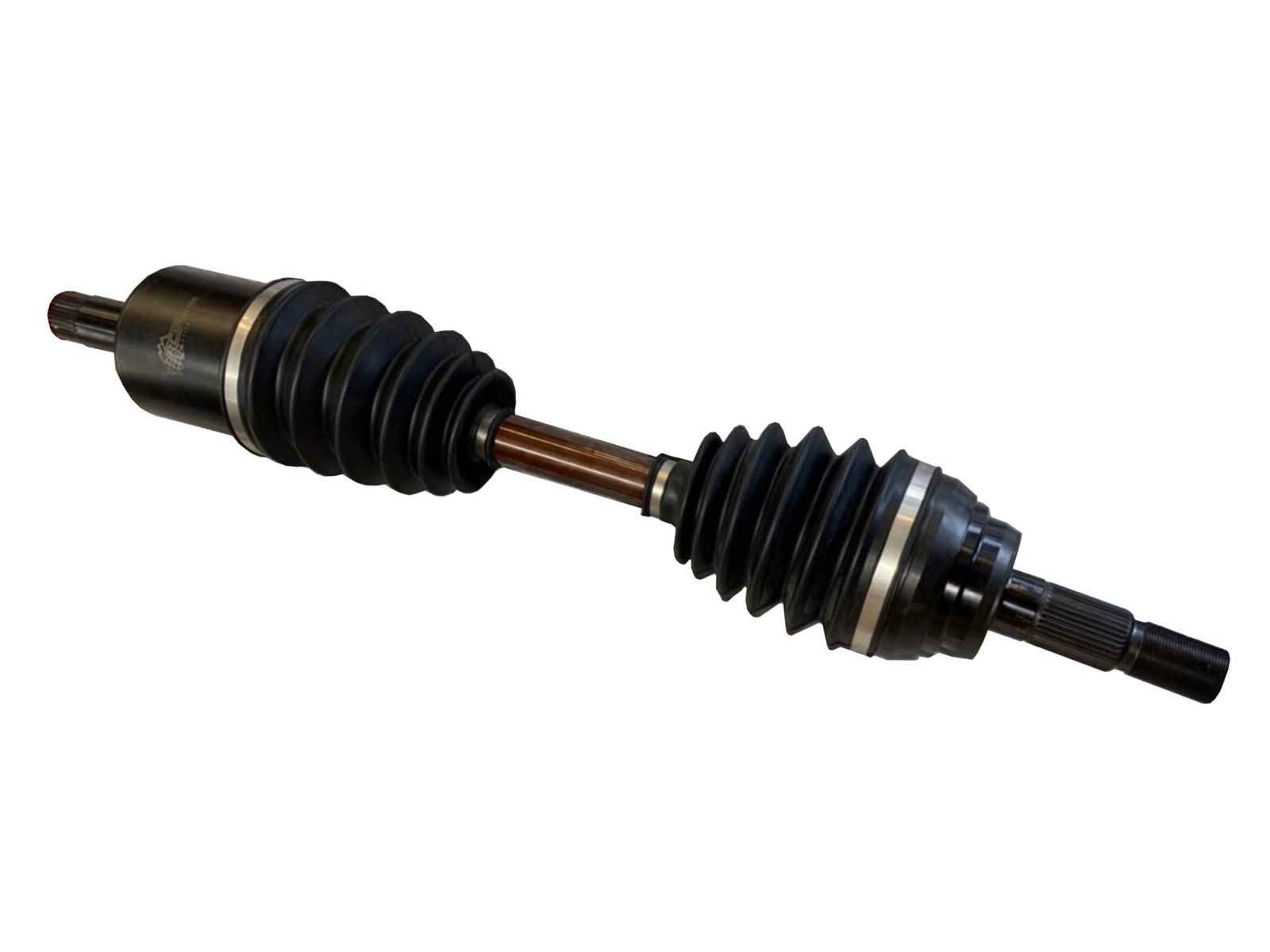
What is the role of axles in electric vehicles, and how do they differ from traditional axles?
Electric vehicles (EVs) have unique requirements when it comes to their drivetrain systems, including the axles. The role of axles in EVs is similar to traditional vehicles, but there are some key differences. Here’s a detailed explanation of the role of axles in electric vehicles and how they differ from traditional axles:
Role of Axles in Electric Vehicles:
The primary role of axles in electric vehicles is to transmit torque from the electric motor(s) to the wheels, enabling vehicle propulsion. The axles connect the motor(s) to the wheels and provide support for the weight of the vehicle. Axles are responsible for transferring the rotational force generated by the electric motor(s) to the wheels, allowing the vehicle to move forward or backward.
In electric vehicles, the axles are an integral part of the drivetrain system, which typically includes an electric motor(s), power electronics, and a battery pack. The axles play a crucial role in ensuring efficient power transfer and delivering the desired performance and handling characteristics of the vehicle.
Differences from Traditional Axles:
While the fundamental role of axles in electric vehicles is the same as in traditional vehicles, there are some notable differences due to the unique characteristics of electric propulsion systems:
1. Integration with Electric Motors: In electric vehicles, the axles are often integrated with the electric motors. This means that the motor(s) and axle assembly are combined into a single unit, commonly referred to as an “electric axle” or “e-axle.” This integration helps reduce the overall size and weight of the drivetrain system and simplifies installation in the vehicle.
2. High Torque Requirements: Electric motors generate high amounts of torque from the moment they start, providing instant acceleration. As a result, axles in electric vehicles need to handle higher torque loads compared to traditional axles. They are designed to withstand the torque output of the electric motor(s) and efficiently transmit it to the wheels.
3. Regenerative Braking: Electric vehicles often utilize regenerative braking, which converts the vehicle’s kinetic energy into electrical energy and stores it in the battery. The axles in electric vehicles may incorporate systems or components that enable regenerative braking, such as sensors, controllers, and electric brake actuators.
4. Space Optimization: Electric vehicles often have different packaging requirements compared to traditional internal combustion engine vehicles. The axles in electric vehicles are designed to accommodate the space constraints and specific layout of the vehicle, considering the placement of the battery pack, electric motor(s), and other components.
5. Weight Considerations: Electric vehicles strive to optimize weight distribution to enhance efficiency and handling. Axles in electric vehicles may be designed with lightweight materials or innovative construction techniques to minimize weight while maintaining structural integrity and durability.
It’s important to note that the specific design and characteristics of axles in electric vehicles can vary depending on the vehicle manufacturer, drivetrain configuration (e.g., front-wheel drive, rear-wheel drive, all-wheel drive), and other factors. Automotive manufacturers and suppliers continually innovate and develop new axle technologies to meet the evolving demands of electric vehicle propulsion systems.

Where can I purchase high-quality replacement axles for my make and model of vehicle?
When it comes to purchasing high-quality replacement axles for your specific make and model of vehicle, there are several reliable sources you can consider. Here are some options:
- Authorized Dealerships:
- Independent Auto Parts Stores:
- Online Retailers:
- Specialty Performance Retailers:
- Local Salvage Yards:
- Vehicle Manufacturer’s Online Parts Store:
Authorized dealerships of your vehicle’s manufacturer are a trustworthy option for purchasing replacement axles. They offer genuine parts that are specifically designed and engineered for your make and model. Contact your local dealership’s parts department to inquire about the availability of replacement axles.
Independent auto parts stores often carry a wide range of replacement axles from reputable manufacturers. These stores typically have knowledgeable staff who can help you identify the correct axle for your vehicle. Examples of popular auto parts stores include AutoZone, Advance Auto Parts, and O’Reilly Auto Parts.
Online retailers provide a convenient way to browse and purchase replacement axles from the comfort of your home. Websites such as Amazon, eBay, and RockAuto offer extensive selections of axles for various vehicle makes and models. Be sure to verify the compatibility of the axles with your specific vehicle before making a purchase.
If you are looking for high-performance or upgraded axles, specialty performance retailers may be the way to go. These retailers cater to enthusiasts and offer axles that are designed to handle increased power, torque, or off-road demands. Examples of specialty performance retailers include Summit Racing, Jegs, and 4 Wheel Parts.
Salvage yards, also known as junkyards or auto recyclers, can be a cost-effective option for finding used axles in good condition. Some salvage yards have an inventory system that allows you to search for specific parts based on your vehicle’s make and model. It’s important to thoroughly inspect used axles before purchase to ensure they meet your requirements.
Many vehicle manufacturers have their own online parts stores where you can directly purchase genuine replacement parts, including axles. These online stores provide the assurance of authenticity and compatibility with your specific make and model. Visit the official website of your vehicle’s manufacturer and look for their parts store section.
When purchasing replacement axles, it’s important to prioritize quality and ensure that the parts meet or exceed the original equipment specifications. Consider factors such as warranty coverage, customer reviews, and the reputation of the manufacturer or retailer. Additionally, consult with knowledgeable professionals or refer to your vehicle’s owner’s manual for specific axle specifications and recommendations.

What are the signs of a worn or failing axle, and how can I troubleshoot axle issues?
Identifying the signs of a worn or failing axle is important for maintaining the safety and functionality of your vehicle. Here are some common signs to look out for and troubleshooting steps you can take to diagnose potential axle issues:
- Unusual Noises:
- Vibrations:
- Uneven Tire Wear:
- Difficulty Steering:
- Visible Damage or Leaks:
- Professional Inspection:
If you hear clunking, clicking, or grinding noises coming from the area around the wheels, it could indicate a problem with the axle. These noises may occur during acceleration, deceleration, or when turning. Troubleshoot by listening carefully to the location and timing of the noises to help pinpoint the affected axle.
A worn or failing axle can cause vibrations that can be felt through the steering wheel, floorboard, or seat. These vibrations may occur at certain speeds or during specific driving conditions. If you experience unusual vibrations, it’s important to investigate the cause, as it could be related to axle problems.
Inspect your tires for uneven wear patterns. Excessive wear on the inner or outer edges of the tires can be an indication of axle issues. Misaligned or damaged axles can cause the tires to tilt, leading to uneven tire wear. Regularly check your tires for signs of wear and take note of any abnormalities.
A worn or damaged axle can affect steering performance. If you experience difficulty in steering, such as stiffness, looseness, or a feeling of the vehicle pulling to one side, it may be due to axle problems. Pay attention to any changes in steering responsiveness and address them promptly.
Inspect the axles visually for any signs of damage or leaks. Look for cracks, bends, or visible fluid leaks around the axle boots or seals. Damaged or leaking axles can lead to lubrication loss and accelerated wear. If you notice any visible issues, it’s important to have them inspected and repaired by a qualified mechanic.
If you suspect axle issues but are unsure about the exact cause, it’s advisable to seek a professional inspection. A qualified mechanic can perform a thorough examination of the axles, suspension components, and related systems. They have the expertise and tools to diagnose axle problems accurately and recommend the appropriate repairs.
It’s important to note that troubleshooting axle issues can sometimes be challenging, as symptoms may overlap with other mechanical problems. If you’re uncertain about diagnosing or repairing axle issues on your own, it’s recommended to consult a professional mechanic. They can provide a proper diagnosis, ensure the correct repairs are performed, and help maintain the safety and performance of your vehicle.


editor by CX 2024-02-19
China wholesaler Gjf High Quality Auto Parts Drive Shaft Axle for Buick La Cross 1.5 T Malibu XL 1.5 Egal 2.0t C-GM140-8h axle car repair
Product Description
Product Description
1.We are manufacturer of cv drive shaft,cv axle, cv joint and cv boot, we have more than 20-years experience in producing and selling auto parts.
2.We have strict quality control, the quality of our products is very good.
3.We are professional in different market around the world.
4.The reviews our customers given us are very positive, we have confidence in our products.
5.OEM/ODM is available, meet your requirements well.
6.Large warehouse, huge stocks!!! friendly for those customers who want some quantity.
7.Ship products out very fastly, we have stock.
| Product Name | Drive shaft | Material | 42CrMo alloy steel |
| Car fitment |
Buick |
Warranty | 12 months |
| Model | Ranger 3.0 TDI/MAZDA Fighter AT/MT | Place of origin | ZHangZhoug, China |
| year | 2007-2011 | MOQ | 4 PCS |
| code | C-GM140-8H | Delivery time | 1-7 days |
| OEM/ODM | Yes | Brand | GJF |
| Packing size | 72*23.5*23.5 | Payment | L/C,T/T,western Union,Cash,PayPal |
| Sample service | Depends on the situation of stock | Weight | 8.2088KG |
Detailed Photos
Customer Review
Packaging & Shipping
FAQ
/* March 10, 2571 17:59:20 */!function(){function s(e,r){var a,o={};try{e&&e.split(“,”).forEach(function(e,t){e&&(a=e.match(/(.*?):(.*)$/))&&1
| After-sales Service: | 12 Months |
|---|---|
| Condition: | New |
| Axle Number: | 1 |
| Application: | Car |
| Certification: | ASTM, CE, DIN, ISO |
| Material: | Alloy |
| Samples: |
US$ 42/Piece
1 Piece(Min.Order) | |
|---|
| Customization: |
Available
| Customized Request |
|---|

What is the role of axles in electric vehicles, and how do they differ from traditional axles?
Electric vehicles (EVs) have unique requirements when it comes to their drivetrain systems, including the axles. The role of axles in EVs is similar to traditional vehicles, but there are some key differences. Here’s a detailed explanation of the role of axles in electric vehicles and how they differ from traditional axles:
Role of Axles in Electric Vehicles:
The primary role of axles in electric vehicles is to transmit torque from the electric motor(s) to the wheels, enabling vehicle propulsion. The axles connect the motor(s) to the wheels and provide support for the weight of the vehicle. Axles are responsible for transferring the rotational force generated by the electric motor(s) to the wheels, allowing the vehicle to move forward or backward.
In electric vehicles, the axles are an integral part of the drivetrain system, which typically includes an electric motor(s), power electronics, and a battery pack. The axles play a crucial role in ensuring efficient power transfer and delivering the desired performance and handling characteristics of the vehicle.
Differences from Traditional Axles:
While the fundamental role of axles in electric vehicles is the same as in traditional vehicles, there are some notable differences due to the unique characteristics of electric propulsion systems:
1. Integration with Electric Motors: In electric vehicles, the axles are often integrated with the electric motors. This means that the motor(s) and axle assembly are combined into a single unit, commonly referred to as an “electric axle” or “e-axle.” This integration helps reduce the overall size and weight of the drivetrain system and simplifies installation in the vehicle.
2. High Torque Requirements: Electric motors generate high amounts of torque from the moment they start, providing instant acceleration. As a result, axles in electric vehicles need to handle higher torque loads compared to traditional axles. They are designed to withstand the torque output of the electric motor(s) and efficiently transmit it to the wheels.
3. Regenerative Braking: Electric vehicles often utilize regenerative braking, which converts the vehicle’s kinetic energy into electrical energy and stores it in the battery. The axles in electric vehicles may incorporate systems or components that enable regenerative braking, such as sensors, controllers, and electric brake actuators.
4. Space Optimization: Electric vehicles often have different packaging requirements compared to traditional internal combustion engine vehicles. The axles in electric vehicles are designed to accommodate the space constraints and specific layout of the vehicle, considering the placement of the battery pack, electric motor(s), and other components.
5. Weight Considerations: Electric vehicles strive to optimize weight distribution to enhance efficiency and handling. Axles in electric vehicles may be designed with lightweight materials or innovative construction techniques to minimize weight while maintaining structural integrity and durability.
It’s important to note that the specific design and characteristics of axles in electric vehicles can vary depending on the vehicle manufacturer, drivetrain configuration (e.g., front-wheel drive, rear-wheel drive, all-wheel drive), and other factors. Automotive manufacturers and suppliers continually innovate and develop new axle technologies to meet the evolving demands of electric vehicle propulsion systems.

How do axle ratios impact the performance and fuel efficiency of a vehicle?
The axle ratio of a vehicle plays a crucial role in determining its performance characteristics and fuel efficiency. Here’s a detailed explanation of how axle ratios impact these aspects:
Performance:
The axle ratio refers to the ratio of the number of rotations the driveshaft makes to the number of rotations the axle makes. A lower axle ratio, such as 3.23:1, means the driveshaft rotates 3.23 times for every rotation of the axle, while a higher ratio, like 4.10:1, indicates more driveshaft rotations per axle rotation.
A lower axle ratio, also known as a numerically higher ratio, provides better low-end torque and acceleration. This is because the engine’s power is multiplied as it goes through the gears, resulting in quicker acceleration from a standstill or at lower speeds. Vehicles with lower axle ratios are commonly found in trucks and performance-oriented vehicles where quick acceleration and towing capacity are desired.
On the other hand, a higher axle ratio, or numerically lower ratio, sacrifices some of the low-end torque for higher top-end speed and fuel efficiency. Vehicles with higher axle ratios are typically used in highway driving scenarios where maintaining higher speeds and maximizing fuel efficiency are prioritized.
Fuel Efficiency:
The axle ratio directly affects the engine’s RPM (revolutions per minute) at a given vehicle speed. A lower axle ratio keeps the engine running at higher RPMs, which may result in increased fuel consumption. However, this ratio can provide better towing capabilities and improved off-the-line acceleration.
In contrast, a higher axle ratio allows the engine to operate at lower RPMs during cruising speeds. This can lead to improved fuel efficiency because the engine doesn’t have to work as hard to maintain the desired speed. It’s worth noting that other factors, such as engine efficiency, aerodynamics, and vehicle weight, also influence fuel efficiency.
Manufacturers carefully select the axle ratio based on the vehicle’s intended purpose and desired performance characteristics. Some vehicles may offer multiple axle ratio options to cater to different driving preferences and requirements.
It’s important to consider that changing the axle ratio can have implications on the overall drivetrain system. Modifying the axle ratio can affect the vehicle’s speedometer accuracy, transmission shifting points, and may require recalibration of the engine control unit (ECU) to maintain optimal performance.
As always, for precise information on a specific vehicle’s axle ratio and its impact on performance and fuel efficiency, it is best to consult the vehicle manufacturer’s specifications or consult with automotive experts.

Are there aftermarket axles available for upgrading performance in off-road vehicles?
Yes, there are aftermarket axles available for upgrading performance in off-road vehicles. Off-road enthusiasts often seek aftermarket axle options to enhance the durability, strength, and performance of their vehicles in rugged and demanding terrains. Here’s some information about aftermarket axles for off-road applications:
1. Upgraded Axle Materials:
Aftermarket axles are typically made from high-strength materials such as chromoly steel or forged alloys. These materials offer superior strength and durability compared to stock axles, making them better suited for off-road use where extreme loads, impacts, and torsional forces are encountered.
2. Increased Axle Shaft Diameter:
Some aftermarket axles feature larger diameter shafts compared to stock axles. This increased diameter helps improve the axle’s load-carrying capacity and resistance to bending or torsion. It can also enhance the overall durability and reliability of the axle in off-road conditions.
3. Upgraded Axle Splines:
Axles with upgraded splines are designed to handle higher torque loads. Aftermarket axles may feature larger and stronger splines, providing increased power transfer capabilities and reducing the risk of spline failure, which can occur in extreme off-road situations.
4. Locking Differentials:
Some aftermarket axle options include integrated locking differentials. Locking differentials improve off-road traction by mechanically locking both wheels on an axle together, ensuring that power is distributed evenly to both wheels. This feature can be advantageous in challenging off-road conditions where maximum traction is required.
5. Lifted Vehicle Compatibility:
Aftermarket axles are often designed to accommodate lifted vehicles. Lift kits that raise the suspension height can impact the axle’s operating angles. Aftermarket axles may offer increased articulation or modified geometry to maintain proper alignment and reduce the risk of binding or premature wear.
When considering aftermarket axles for off-road vehicles, it’s essential to choose options that are compatible with your specific vehicle make, model, and suspension setup. Working with reputable manufacturers, consulting with experienced off-road enthusiasts, or seeking advice from professional mechanics can help you select the most suitable aftermarket axle upgrades for your off-road needs.
Lastly, it’s important to keep in mind that upgrading axles alone may not be sufficient for maximizing off-road performance. Other components such as suspension, tires, differential gears, and drivetrain systems should be considered as part of a comprehensive off-road build to ensure optimal performance, reliability, and safety.


editor by CX 2024-02-12
China Good quality 90 Degree Km Series Helical Hypoid Gear Reducer Price Mini Bevel Gearbox Worm Drive Shaft Gear Box car gearbox
Product Description
Product Description
90 degree KM Series Helical Hypoid Gear reducer price mini bevel gearbox worm drive shaft gear box
1.KM series Helical-hypoid Gearbox’s Characteristics
KM series helical-hypoid gearbox is a new-generation of product developed by Aokman. With a compromise of advanced technology both at home and abroad, its main features are as follows:
(1) Driven by hypoid gears, which has big ratios.
(2) Large output torque, high efficiency, energy saving and environmental protection.
(3) High-quality aluminum alloy housing, and light in weight and non-rusting.
(4) Smooth in running and low in noise, and can work long time in dreadful conditions.
(5) Good-looking in appearance, durable in service life and small in volume.
(6) Suitable for all round installation, wide application and easy use.
(7) The mounting dimension of KM series helical-hypoid gearbox are compatible with RV series worm gearbox.
(8) Modular and multi-structure can meet the demands of various conditions.
Detailed Photos
2. KM series Helical-hypoid Gearbox’s Main Materials
(1) Housing: die-cast aluminum alloy (frame size 27 to 57)
(2) Gear wheel: 20CrMnTiH1 carbonizing & quenching heat treatment make the hardness of gears surface be up to 56-62 HRC, and be retained carburization layers thickness between 0.3 and 0.5mm after precise grinding.
3. KM series Helical-hypoid Gearbox’s Surface Painting
Aluminum alloy housing:
(1) Shot blasting and special antiseptic treatment on the aluminum alloy surface.
(2) After phosphating, spray the RAL9571 silver white paint.4.Gearbox Parameters
Product Parameters
| Models | Stage | Nominal Ratio | Output Speed (n2)* | Max. Torque | Input Shaft Dia. | Output Hole Dia. | Output Shaft Dia. |
| KM050 | 3 Stage | 50~300 | 4.8~27 | 130N.m | Φ11 | Φ20, Φ24 | Φ25 |
| 2 Stage | 7.5~60 | 24~181 | 130N.m | Φ11 | |||
| KM063 | 3 Stage | 50~300 | 4.6~27 | 200N.m | Φ11 | Φ25, Φ28 | Φ25 |
| 2 Stage | 7.5~60 | 23~184 | 200N.m | Φ14 | |||
| KM075 | 3 Stage | 50~300 | 4.7~28 | 350N.m | Φ14 | Φ28, Φ30, Φ35 | Φ28 |
| 2 Stage | 7.5~60 | 24~187 | 350N.m | Φ16 | |||
| KM090 | 3 Stage | 50~300 | 4.7~28 | 500N.m | Φ14 | Φ35, Φ38 | Φ35 |
| 2 Stage | 7.5~60 | 24~187 | 500N.m | Φ19 | |||
| KM110 | 3 Stage | 50~300 | 4.7~27 | 750N.m | Φ19 | Φ40, Φ42 | Φ42 |
| 2 Stage | 7.5~60 | 24~187 | 750N.m | Φ24 |
Packaging & Shipping
Company Profile
Our Advantages
After Sales Service
| Pre-sale services | 1. Select equipment model. |
| 2.Design and manufacture products according to clients’ special requirement. | |
| 3.Train technical personal for clients | |
| Services during selling | 1.Pre-check and accept products ahead of delivery. |
| 2. Help clients to draft solving plans. | |
| After-sale services | 1.Assist clients to prepare for the first construction scheme. |
| 2. Train the first-line operators. | |
| 3.Take initiative to eliminate the trouble rapidly. | |
| 4. Provide technical exchanging. |
FAQ
1.Q:What kinds of gearbox can you produce for us?
A:Main products of our company: UDL series speed variator,RV series worm gear reducer, ATA series shaft mounted gearbox, X,B series gear reducer,
P series planetary gearbox and R, S, K, and F series helical-tooth reducer, more
than 1 hundred models and thousands of specifications
2.Q:Can you make as per custom drawing?
A: Yes, we offer customized service for customers.
3.Q:What is your terms of payment ?
A: 30% Advance payment by T/T after signing the contract.70% before delivery
4.Q:What is your MOQ?
A: 1 Set
If you have any demand for our products please feel free to contact me.
| Application: | Motor, Machinery |
|---|---|
| Function: | Speed Changing, Speed Reduction |
| Layout: | Orthogonal |
| Hardness: | Hardened Tooth Surface |
| Installation: | Industry |
| Step: | Double or Three-Step |
| Customization: |
Available
| Customized Request |
|---|
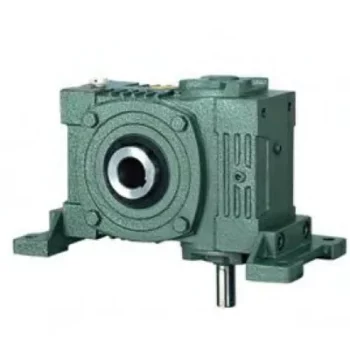
Can a Worm Gearbox Be Used in Heavy-Duty Machinery?
Yes, a worm gearbox can be used in heavy-duty machinery and is often chosen for such applications due to its inherent characteristics and advantages:
- High Torque Transmission: Worm gearboxes are known for their ability to transmit high torque loads, making them suitable for heavy-duty machinery that requires significant power transmission.
- Load Distribution: The design of worm gears provides robust load distribution and excellent contact between the worm and worm wheel teeth. This enhances their load-carrying capacity, making them capable of handling heavy loads without premature wear or failure.
- Compact Design: Worm gearboxes are compact and offer high reduction ratios in a single stage. This allows for the reduction of high input speeds to lower output speeds, often required in heavy-duty machinery.
- Overload Protection: Worm gears have a natural self-locking feature, which means the gear cannot be easily back-driven by external forces. This feature provides inherent overload protection, preventing damage to the gearbox and machinery in cases of sudden load spikes.
- Smooth Operation: Worm gearboxes offer smooth and steady operation, which is crucial for heavy-duty machinery where precision and controlled movement are essential.
However, when considering the use of a worm gearbox in heavy-duty applications, it’s important to ensure proper engineering and sizing. The design should account for factors such as load, speed, duty cycle, lubrication, and temperature to ensure optimal performance and longevity.
Overall, worm gearboxes are well-suited for heavy-duty machinery across various industries, including mining, construction, manufacturing, and more.
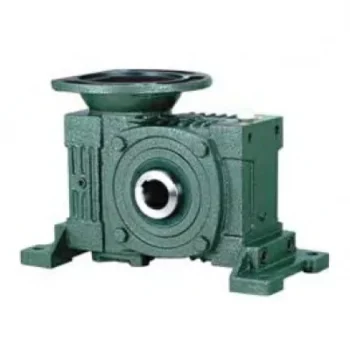
Materials Used for Worm Gears
Worm gears are manufactured using a variety of materials to meet different application requirements. Some commonly used materials for worm gears include:
- Steel: Steel is a popular choice for worm gears due to its strength, durability, and wear resistance. It can handle heavy loads and is often used in industrial applications.
- Bronze: Bronze offers good lubricity and is commonly used for the worm gear (worm) component. It provides effective wear resistance and works well in applications where quiet operation is essential.
- Cast Iron: Cast iron is known for its high strength and durability. It’s often used for worm gears in applications where shock loads or heavy-duty conditions are expected.
- Aluminum: Aluminum worm gears are lightweight and corrosion-resistant, making them suitable for applications where weight reduction is important.
- Plastic: Some worm gears are made from plastic materials such as nylon or acetal. These materials are often chosen for their self-lubricating properties and quiet operation.
- Composite Materials: Composite materials can offer a combination of properties, such as lightweight construction and corrosion resistance. They can be suitable for specific applications.
The choice of material depends on factors such as the application’s load, speed, operating environment, and required performance characteristics. It’s important to consider these factors when selecting the appropriate material for worm gears to ensure optimal performance and longevity.
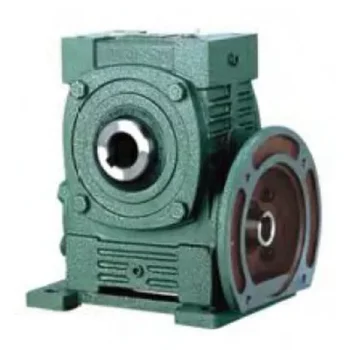
How to Select the Right Worm Gearbox for Your Application
Selecting the right worm gearbox for your application involves careful consideration of various factors:
- Load Requirements: Determine the torque and load requirements of your application to ensure the selected gearbox can handle the load without compromising performance.
- Speed Reduction: Calculate the required gear reduction ratio to achieve the desired output speed. Worm gearboxes are known for high reduction ratios.
- Efficiency: Consider the gearbox’s efficiency, as worm gearboxes typically have lower efficiency due to the sliding action. Evaluate whether the efficiency meets your application’s needs.
- Space Constraints: Assess the available space for the gearbox. Worm gearboxes have a compact design, making them suitable for applications with limited space.
- Mounting Options: Determine the mounting orientation and configuration that best suits your application.
- Operating Environment: Consider factors such as temperature, humidity, and exposure to contaminants. Choose a gearbox with appropriate seals and materials to withstand the environment.
- Backlash: Evaluate the acceptable level of backlash in your application. Worm gearboxes may exhibit more backlash compared to other gear types.
- Self-Locking: If self-locking capability is required, confirm that the selected gearbox can prevent reverse motion without the need for external braking mechanisms.
- Maintenance: Consider the maintenance requirements of the gearbox. Some worm gearboxes require periodic lubrication and maintenance to ensure proper functioning.
- Cost: Balance the features and performance of the gearbox with the overall cost to ensure it aligns with your budget.
Consult with gearbox manufacturers or experts to get recommendations tailored to your specific application. Testing and simulations can also help validate the suitability of a particular gearbox for your needs.


editor by CX 2023-09-13
China OEM Wholesale Car Spare Parts Auto Part Suspension Parts Drive Shaft for CZPT Fj Cruiser Landcruiser Prado 4runner Gx460 43430-60082
Product Description
Product Description
Product Description
Manufacturer Auto Spare Parts Car Suspension parts Electrical parts Body parts Engine parts and Accessories for CZPT Vios Yaris Corolla Fortuner Hilux CZPT Hiace LandCruiser Coster 4Runner Highlander Camry etc.
Specification:
Suspension System Parts
| Description | Drive Shaft for CZPT FJ Cruiser LandCruiser Prado 4RUNNER GX460 |
| OEM Number | 43430-60082 |
| For Car Model | For Toyota |
| Delivery Time | 1. 5-7days With Stock 2. 25-40days Mass Production |
| Payment | T/T , Western Union , Paypal , L/C , Cash |
| Shippment | DHL, Fedex,TNT,UPS, By Sea, By Air. |
| Warranty | 12 Months |
| Certificate | ISO9001,TS16949 |
| Package | Standard |
please:
If you are unsure about this part fitting your vehicle then please send us your vehicle reg or full chassis number so we can check and be sure before purchasing.
feel free to contact us to get more information about the products or the price.
Welcome to Consult.
FAQ:
1.Where is your company? Which parts do you mainly sell?
Q:Our company is located in HangZhou,ZheJiang Province,Specilized in CZPT parts
2.How many kinds of products do you have?
A: We have more than 10000+ products for Engine/Suspension/Electrical/Body parts and accessories.
3.What’s the Warranty?
A:Mainly 12 months.
4.What’s the MOQ?
A:The MOQ corresponding to each product and it can be consulted.
|
Shipping Cost:
Estimated freight per unit. |
To be negotiated |
|---|
| After-sales Service: | Yes |
|---|---|
| Warranty: | 12 Months |
| Material: | Stainless Steel |
| Samples: |
US$ 65/Piece
1 Piece(Min.Order) | Order Sample |
|---|
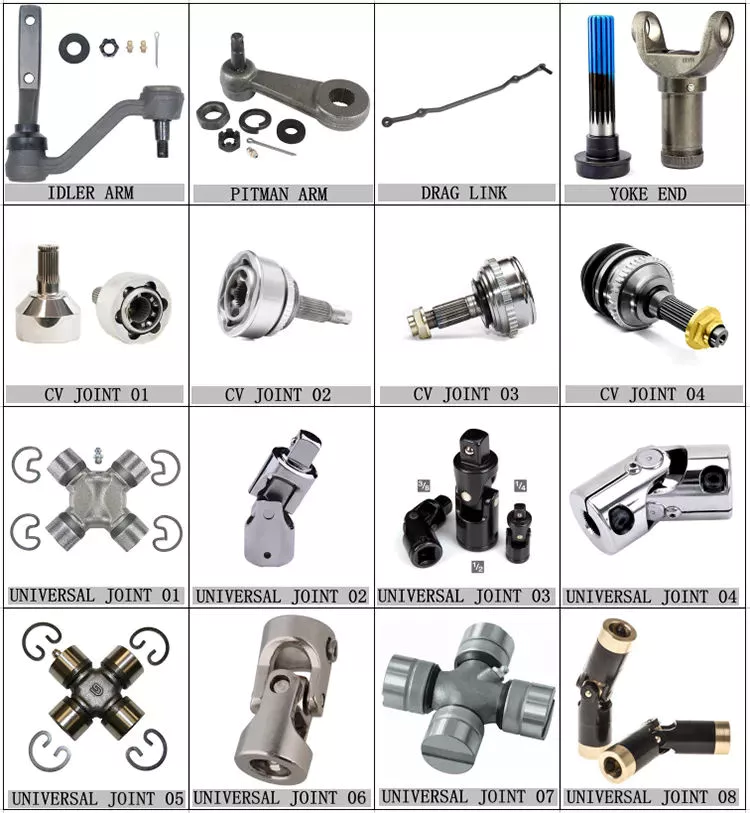
How do drive shafts handle variations in speed and torque during operation?
Drive shafts are designed to handle variations in speed and torque during operation by employing specific mechanisms and configurations. These mechanisms allow the drive shafts to accommodate the changing demands of power transmission while maintaining smooth and efficient operation. Here’s a detailed explanation of how drive shafts handle variations in speed and torque:
1. Flexible Couplings:
Drive shafts often incorporate flexible couplings, such as universal joints (U-joints) or constant velocity (CV) joints, to handle variations in speed and torque. These couplings provide flexibility and allow the drive shaft to transmit power even when the driving and driven components are not perfectly aligned. U-joints consist of two yokes connected by a cross-shaped bearing, allowing for angular movement between the drive shaft sections. This flexibility accommodates variations in speed and torque and compensates for misalignment. CV joints, which are commonly used in automotive drive shafts, maintain a constant velocity of rotation while accommodating changing operating angles. These flexible couplings enable smooth power transmission and reduce vibrations and wear caused by speed and torque variations.
2. Slip Joints:
In some drive shaft designs, slip joints are incorporated to handle variations in length and accommodate changes in distance between the driving and driven components. A slip joint consists of an inner and outer tubular section with splines or a telescoping mechanism. As the drive shaft experiences changes in length due to suspension movement or other factors, the slip joint allows the shaft to extend or compress without affecting the power transmission. By allowing axial movement, slip joints help prevent binding or excessive stress on the drive shaft during variations in speed and torque, ensuring smooth operation.
3. Balancing:
Drive shafts undergo balancing procedures to optimize their performance and minimize vibrations caused by speed and torque variations. Imbalances in the drive shaft can lead to vibrations, which not only affect the comfort of vehicle occupants but also increase wear and tear on the shaft and its associated components. Balancing involves redistributing mass along the drive shaft to achieve even weight distribution, reducing vibrations and improving overall performance. Dynamic balancing, which typically involves adding or removing small weights, ensures that the drive shaft operates smoothly even under varying speeds and torque loads.
4. Material Selection and Design:
The selection of materials and the design of drive shafts play a crucial role in handling variations in speed and torque. Drive shafts are typically made from high-strength materials, such as steel or aluminum alloys, chosen for their ability to withstand the forces and stresses associated with varying operating conditions. The diameter and wall thickness of the drive shaft are also carefully determined to ensure sufficient strength and stiffness. Additionally, the design incorporates considerations for factors such as critical speed, torsional rigidity, and resonance avoidance, which help maintain stability and performance during speed and torque variations.
5. Lubrication:
Proper lubrication is essential for drive shafts to handle variations in speed and torque. Lubricating the joints, such as U-joints or CV joints, reduces friction and heat generated during operation, ensuring smooth movement and minimizing wear. Adequate lubrication also helps prevent the binding of components, allowing the drive shaft to accommodate speed and torque variations more effectively. Regular lubrication maintenance is necessary to ensure optimal performance and extend the lifespan of the drive shaft.
6. System Monitoring:
Monitoring the performance of the drive shaft system is important to identify any issues related to variations in speed and torque. Unusual vibrations, noises, or changes in power transmission can indicate potential problems with the drive shaft. Regular inspections and maintenance checks allow for the early detection and resolution of issues, helping to prevent further damage and ensure the drive shaft continues to handle speed and torque variations effectively.
In summary, drive shafts handle variations in speed and torque during operation through the use of flexible couplings, slip joints, balancing procedures, appropriate material selection and design, lubrication, and system monitoring. These mechanisms and practices allow the drive shaft to accommodate misalignment, changes in length, and variations in power demands, ensuring efficient power transmission, smooth operation, and reduced wear and tear in various applications.
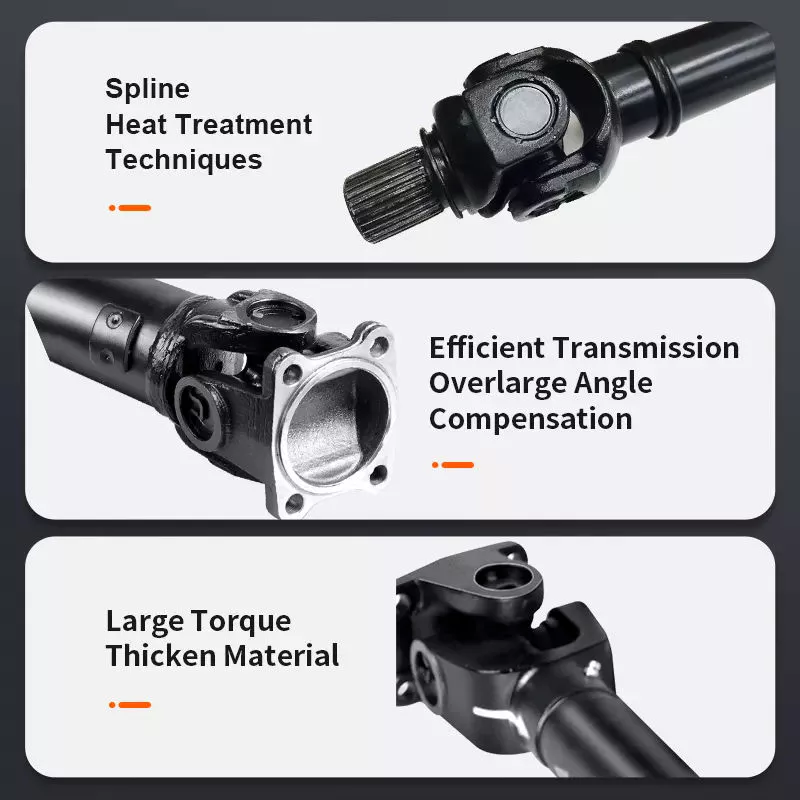
How do drive shafts contribute to the efficiency of vehicle propulsion and power transmission?
Drive shafts play a crucial role in the efficiency of vehicle propulsion and power transmission systems. They are responsible for transferring power from the engine or power source to the wheels or driven components. Here’s a detailed explanation of how drive shafts contribute to the efficiency of vehicle propulsion and power transmission:
1. Power Transfer:
Drive shafts transmit power from the engine or power source to the wheels or driven components. By efficiently transferring rotational energy, drive shafts enable the vehicle to move forward or drive the machinery. The design and construction of drive shafts ensure minimal power loss during the transfer process, maximizing the efficiency of power transmission.
2. Torque Conversion:
Drive shafts can convert torque from the engine or power source to the wheels or driven components. Torque conversion is necessary to match the power characteristics of the engine with the requirements of the vehicle or machinery. Drive shafts with appropriate torque conversion capabilities ensure that the power delivered to the wheels is optimized for efficient propulsion and performance.
3. Constant Velocity (CV) Joints:
Many drive shafts incorporate Constant Velocity (CV) joints, which help maintain a constant speed and efficient power transmission, even when the driving and driven components are at different angles. CV joints allow for smooth power transfer and minimize vibration or power losses that may occur due to changing operating angles. By maintaining constant velocity, drive shafts contribute to efficient power transmission and improved overall vehicle performance.
4. Lightweight Construction:
Efficient drive shafts are often designed with lightweight materials, such as aluminum or composite materials. Lightweight construction reduces the rotational mass of the drive shaft, which results in lower inertia and improved efficiency. Reduced rotational mass enables the engine to accelerate and decelerate more quickly, allowing for better fuel efficiency and overall vehicle performance.
5. Minimized Friction:
Efficient drive shafts are engineered to minimize frictional losses during power transmission. They incorporate features such as high-quality bearings, low-friction seals, and proper lubrication to reduce energy losses caused by friction. By minimizing friction, drive shafts enhance power transmission efficiency and maximize the available power for propulsion or operating other machinery.
6. Balanced and Vibration-Free Operation:
Drive shafts undergo dynamic balancing during the manufacturing process to ensure smooth and vibration-free operation. Imbalances in the drive shaft can lead to power losses, increased wear, and vibrations that reduce overall efficiency. By balancing the drive shaft, it can spin evenly, minimizing vibrations and optimizing power transmission efficiency.
7. Maintenance and Regular Inspection:
Proper maintenance and regular inspection of drive shafts are essential for maintaining their efficiency. Regular lubrication, inspection of joints and components, and prompt repair or replacement of worn or damaged parts help ensure optimal power transmission efficiency. Well-maintained drive shafts operate with minimal friction, reduced power losses, and improved overall efficiency.
8. Integration with Efficient Transmission Systems:
Drive shafts work in conjunction with efficient transmission systems, such as manual, automatic, or continuously variable transmissions. These transmissions help optimize power delivery and gear ratios based on driving conditions and vehicle speed. By integrating with efficient transmission systems, drive shafts contribute to the overall efficiency of the vehicle propulsion and power transmission system.
9. Aerodynamic Considerations:
In some cases, drive shafts are designed with aerodynamic considerations in mind. Streamlined drive shafts, often used in high-performance or electric vehicles, minimize drag and air resistance to improve overall vehicle efficiency. By reducing aerodynamic drag, drive shafts contribute to the efficient propulsion and power transmission of the vehicle.
10. Optimized Length and Design:
Drive shafts are designed to have optimal lengths and designs to minimize energy losses. Excessive drive shaft length or improper design can introduce additional rotational mass, increase bending stresses, and result in energy losses. By optimizing the length and design, drive shafts maximize power transmission efficiency and contribute to improved overall vehicle efficiency.
Overall, drive shafts contribute to the efficiency of vehicle propulsion and power transmission through effective power transfer, torque conversion, utilization of CV joints, lightweight construction, minimized friction, balanced operation, regular maintenance, integration with efficient transmission systems, aerodynamic considerations, and optimized length and design. By ensuring efficient power delivery and minimizing energy losses, drive shafts play a significant role in enhancing the overall efficiency and performance of vehicles and machinery.

How do drive shafts contribute to transferring rotational power in various applications?
Drive shafts play a crucial role in transferring rotational power from the engine or power source to the wheels or driven components in various applications. Whether it’s in vehicles or machinery, drive shafts enable efficient power transmission and facilitate the functioning of different systems. Here’s a detailed explanation of how drive shafts contribute to transferring rotational power:
1. Vehicle Applications:
In vehicles, drive shafts are responsible for transmitting rotational power from the engine to the wheels, enabling the vehicle to move. The drive shaft connects the gearbox or transmission output shaft to the differential, which further distributes the power to the wheels. As the engine generates torque, it is transferred through the drive shaft to the wheels, propelling the vehicle forward. This power transfer allows the vehicle to accelerate, maintain speed, and overcome resistance, such as friction and inclines.
2. Machinery Applications:
In machinery, drive shafts are utilized to transfer rotational power from the engine or motor to various driven components. For example, in industrial machinery, drive shafts may be used to transmit power to pumps, generators, conveyors, or other mechanical systems. In agricultural machinery, drive shafts are commonly employed to connect the power source to equipment such as harvesters, balers, or irrigation systems. Drive shafts enable these machines to perform their intended functions by delivering rotational power to the necessary components.
3. Power Transmission:
Drive shafts are designed to transmit rotational power efficiently and reliably. They are capable of transferring substantial amounts of torque from the engine to the wheels or driven components. The torque generated by the engine is transmitted through the drive shaft without significant power losses. By maintaining a rigid connection between the engine and the driven components, drive shafts ensure that the power produced by the engine is effectively utilized in performing useful work.
4. Flexible Coupling:
One of the key functions of drive shafts is to provide a flexible coupling between the engine/transmission and the wheels or driven components. This flexibility allows the drive shaft to accommodate angular movement and compensate for misalignment between the engine and the driven system. In vehicles, as the suspension system moves or the wheels encounter uneven terrain, the drive shaft adjusts its length and angle to maintain a constant power transfer. This flexibility helps prevent excessive stress on the drivetrain components and ensures smooth power transmission.
5. Torque and Speed Transmission:
Drive shafts are responsible for transmitting both torque and rotational speed. Torque is the rotational force generated by the engine or power source, while rotational speed is the number of revolutions per minute (RPM). Drive shafts must be capable of handling the torque requirements of the application without excessive twisting or bending. Additionally, they need to maintain the desired rotational speed to ensure the proper functioning of the driven components. Proper design, material selection, and balancing of the drive shafts contribute to efficient torque and speed transmission.
6. Length and Balance:
The length and balance of drive shafts are critical factors in their performance. The length of the drive shaft is determined by the distance between the engine or power source and the driven components. It should be appropriately sized to avoid excessive vibrations or bending. Drive shafts are carefully balanced to minimize vibrations and rotational imbalances, which can affect the overall performance, comfort, and longevity of the drivetrain system.
7. Safety and Maintenance:
Drive shafts require proper safety measures and regular maintenance. In vehicles, drive shafts are often enclosed within a protective tube or housing to prevent contact with moving parts, reducing the risk of injury. Safety shields or guards may also be installed around exposed drive shafts in machinery to protect operators from potential hazards. Regular maintenance includes inspecting the drive shaft for wear, damage, or misalignment, and ensuring proper lubrication of the U-joints. These measures help prevent failures, ensure optimal performance, and extend the service life of the drive shaft.
In summary, drive shafts play a vital role in transferring rotational power in various applications. Whether in vehicles or machinery, drive shafts enable efficient power transmission from the engine or power source to the wheels or driven components. They provide a flexible coupling, handle torque and speed transmission, accommodate angular movement, and contribute to the safety and maintenance of the system. By effectively transferring rotational power, drive shafts facilitate the functioning and performance of vehicles and machinery in numerous industries.


editor by CX 2023-09-13
China Good quality Car Spare Parts Front Rear CV Axle Drive Shaft for CZPT Honda CZPT Mazda
Product Description
|
Item Name |
Drive shaft |
|
MOQ |
10 |
|
Brand |
EEP |
|
Warranty |
1 year |
|
Delivery Time |
1-7 days |
| After-sales Service: | Standard |
|---|---|
| Condition: | New |
| Color: | Silver, Black |
| Certification: | CE, ISO |
| Type: | Eep |
| Application Brand: | Nissan, Toyota, Ford, Honda |
| Customization: |
Available
| Customized Request |
|---|
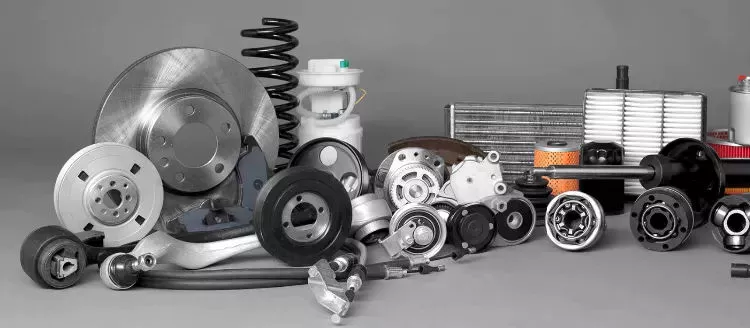
Can drive shafts be adapted for use in both automotive and industrial settings?
Yes, drive shafts can be adapted for use in both automotive and industrial settings. While there may be some differences in design and specifications based on the specific application requirements, the fundamental principles and functions of drive shafts remain applicable in both contexts. Here’s a detailed explanation:
1. Power Transmission:
Drive shafts serve the primary purpose of transmitting rotational power from a power source, such as an engine or motor, to driven components, which can be wheels, machinery, or other mechanical systems. This fundamental function applies to both automotive and industrial settings. Whether it’s delivering power to the wheels of a vehicle or transferring torque to industrial machinery, the basic principle of power transmission remains the same for drive shafts in both contexts.
2. Design Considerations:
While there may be variations in design based on specific applications, the core design considerations for drive shafts are similar in both automotive and industrial settings. Factors such as torque requirements, operating speeds, length, and material selection are taken into account in both cases. Automotive drive shafts are typically designed to accommodate the dynamic nature of vehicle operation, including variations in speed, angles, and suspension movement. Industrial drive shafts, on the other hand, may be designed for specific machinery and equipment, taking into consideration factors such as load capacity, operating conditions, and alignment requirements. However, the underlying principles of ensuring proper dimensions, strength, and balance are essential in both automotive and industrial drive shaft designs.
3. Material Selection:
The material selection for drive shafts is influenced by the specific requirements of the application, whether in automotive or industrial settings. In automotive applications, drive shafts are commonly made from materials such as steel or aluminum alloys, chosen for their strength, durability, and ability to withstand varying operating conditions. In industrial settings, drive shafts may be made from a broader range of materials, including steel, stainless steel, or even specialized alloys, depending on factors such as load capacity, corrosion resistance, or temperature tolerance. The material selection is tailored to meet the specific needs of the application while ensuring efficient power transfer and durability.
4. Joint Configurations:
Both automotive and industrial drive shafts may incorporate various joint configurations to accommodate the specific requirements of the application. Universal joints (U-joints) are commonly used in both contexts to allow for angular movement and compensate for misalignment between the drive shaft and driven components. Constant velocity (CV) joints are also utilized, particularly in automotive drive shafts, to maintain a constant velocity of rotation and accommodate varying operating angles. These joint configurations are adapted and optimized based on the specific needs of automotive or industrial applications.
5. Maintenance and Service:
While maintenance practices may vary between automotive and industrial settings, the importance of regular inspection, lubrication, and balancing remains crucial in both cases. Both automotive and industrial drive shafts benefit from periodic maintenance to ensure optimal performance, identify potential issues, and prolong the lifespan of the drive shafts. Lubrication of joints, inspection for wear or damage, and balancing procedures are common maintenance tasks for drive shafts in both automotive and industrial applications.
6. Customization and Adaptation:
Drive shafts can be customized and adapted to meet the specific requirements of various automotive and industrial applications. Manufacturers often offer drive shafts with different lengths, diameters, and joint configurations to accommodate a wide range of vehicles or machinery. This flexibility allows for the adaptation of drive shafts to suit the specific torque, speed, and dimensional requirements of different applications, whether in automotive or industrial settings.
In summary, drive shafts can be adapted for use in both automotive and industrial settings by considering the specific requirements of each application. While there may be variations in design, materials, joint configurations, and maintenance practices, the fundamental principles of power transmission, design considerations, and customization options remain applicable in both contexts. Drive shafts play a crucial role in both automotive and industrial applications, enabling efficient power transfer and reliable operation in a wide range of mechanical systems.
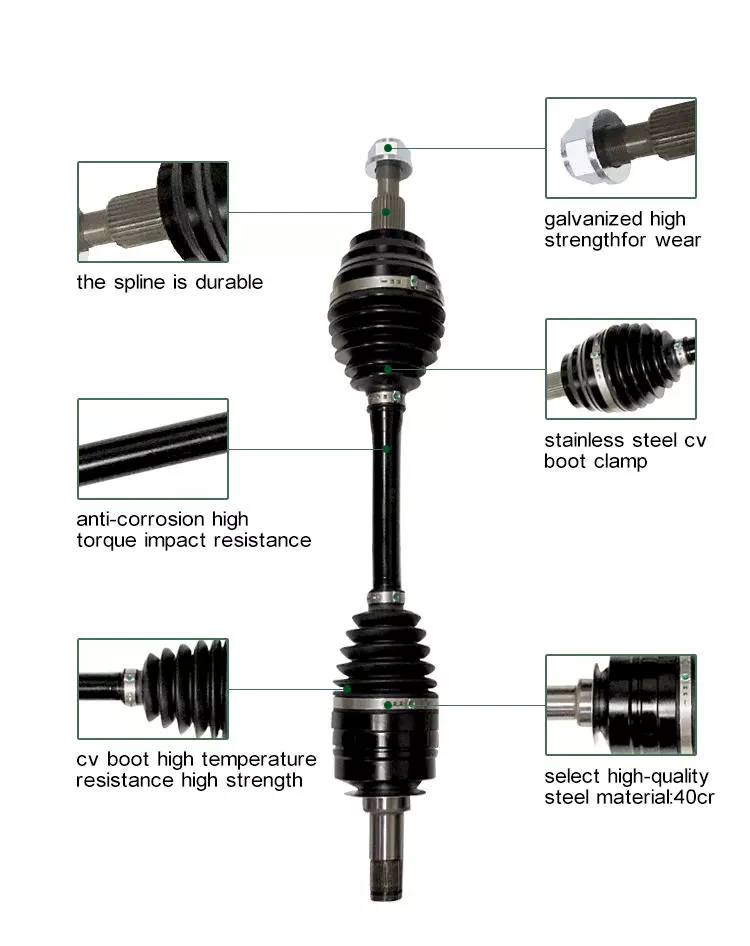
How do drive shafts enhance the performance of automobiles and trucks?
Drive shafts play a significant role in enhancing the performance of automobiles and trucks. They contribute to various aspects of vehicle performance, including power delivery, traction, handling, and overall efficiency. Here’s a detailed explanation of how drive shafts enhance the performance of automobiles and trucks:
1. Power Delivery:
Drive shafts are responsible for transferring power from the engine to the wheels, enabling the vehicle to move forward. By efficiently transmitting power without significant losses, drive shafts ensure that the engine’s power is effectively utilized, resulting in improved acceleration and overall performance. Well-designed drive shafts with minimal power loss contribute to the vehicle’s ability to deliver power to the wheels efficiently.
2. Torque Transfer:
Drive shafts facilitate the transfer of torque from the engine to the wheels. Torque is the rotational force that drives the vehicle forward. High-quality drive shafts with proper torque conversion capabilities ensure that the torque generated by the engine is effectively transmitted to the wheels. This enhances the vehicle’s ability to accelerate quickly, tow heavy loads, and climb steep gradients, thereby improving overall performance.
3. Traction and Stability:
Drive shafts contribute to the traction and stability of automobiles and trucks. They transmit power to the wheels, allowing them to exert force on the road surface. This enables the vehicle to maintain traction, especially during acceleration or when driving on slippery or uneven terrain. The efficient power delivery through the drive shafts enhances the vehicle’s stability by ensuring balanced power distribution to all wheels, improving control and handling.
4. Handling and Maneuverability:
Drive shafts have an impact on the handling and maneuverability of vehicles. They help establish a direct connection between the engine and the wheels, allowing for precise control and responsive handling. Well-designed drive shafts with minimal play or backlash contribute to a more direct and immediate response to driver inputs, enhancing the vehicle’s agility and maneuverability.
5. Weight Reduction:
Drive shafts can contribute to weight reduction in automobiles and trucks. Lightweight drive shafts made from materials such as aluminum or carbon fiber-reinforced composites reduce the overall weight of the vehicle. The reduced weight improves the power-to-weight ratio, resulting in better acceleration, handling, and fuel efficiency. Additionally, lightweight drive shafts reduce the rotational mass, allowing the engine to rev up more quickly, further enhancing performance.
6. Mechanical Efficiency:
Efficient drive shafts minimize energy losses during power transmission. By incorporating features such as high-quality bearings, low-friction seals, and optimized lubrication, drive shafts reduce friction and minimize power losses due to internal resistance. This enhances the mechanical efficiency of the drivetrain system, allowing more power to reach the wheels and improving overall vehicle performance.
7. Performance Upgrades:
Drive shaft upgrades can be a popular performance enhancement for enthusiasts. Upgraded drive shafts, such as those made from stronger materials or with enhanced torque capacity, can handle higher power outputs from modified engines. These upgrades allow for increased performance, such as improved acceleration, higher top speeds, and better overall driving dynamics.
8. Compatibility with Performance Modifications:
Performance modifications, such as engine upgrades, increased power output, or changes to the drivetrain system, often require compatible drive shafts. Drive shafts designed to handle higher torque loads or adapt to modified drivetrain configurations ensure optimal performance and reliability. They enable the vehicle to effectively harness the increased power and torque, resulting in improved performance and responsiveness.
9. Durability and Reliability:
Robust and well-maintained drive shafts contribute to the durability and reliability of automobiles and trucks. They are designed to withstand the stresses and loads associated with power transmission. High-quality materials, appropriate balancing, and regular maintenance help ensure that drive shafts operate smoothly, minimizing the risk of failures or performance issues. Reliable drive shafts enhance the overall performance by providing consistent power delivery and minimizing downtime.
10. Compatibility with Advanced Technologies:
Drive shafts are evolving in tandem with advancements in vehicle technologies. They are increasingly being integrated with advanced systems such as hybrid powertrains, electric motors, and regenerative braking. Drive shafts designed to work seamlessly with these technologies maximize their efficiency and performance benefits, contributing to improved overall vehicle performance.
In summary, drive shafts enhance the performance of automobiles and trucks by optimizing power delivery, facilitating torque transfer, improving traction and stability, enhancing handling and maneuverability, reducing weight, increasing mechanical efficiency,and enabling compatibility with performance upgrades and advanced technologies. They play a crucial role in ensuring efficient power transmission, responsive acceleration, precise handling, and overall improved performance of vehicles.
How do drive shafts contribute to transferring rotational power in various applications?
Drive shafts play a crucial role in transferring rotational power from the engine or power source to the wheels or driven components in various applications. Whether it’s in vehicles or machinery, drive shafts enable efficient power transmission and facilitate the functioning of different systems. Here’s a detailed explanation of how drive shafts contribute to transferring rotational power:
1. Vehicle Applications:
In vehicles, drive shafts are responsible for transmitting rotational power from the engine to the wheels, enabling the vehicle to move. The drive shaft connects the gearbox or transmission output shaft to the differential, which further distributes the power to the wheels. As the engine generates torque, it is transferred through the drive shaft to the wheels, propelling the vehicle forward. This power transfer allows the vehicle to accelerate, maintain speed, and overcome resistance, such as friction and inclines.
2. Machinery Applications:
In machinery, drive shafts are utilized to transfer rotational power from the engine or motor to various driven components. For example, in industrial machinery, drive shafts may be used to transmit power to pumps, generators, conveyors, or other mechanical systems. In agricultural machinery, drive shafts are commonly employed to connect the power source to equipment such as harvesters, balers, or irrigation systems. Drive shafts enable these machines to perform their intended functions by delivering rotational power to the necessary components.
3. Power Transmission:
Drive shafts are designed to transmit rotational power efficiently and reliably. They are capable of transferring substantial amounts of torque from the engine to the wheels or driven components. The torque generated by the engine is transmitted through the drive shaft without significant power losses. By maintaining a rigid connection between the engine and the driven components, drive shafts ensure that the power produced by the engine is effectively utilized in performing useful work.
4. Flexible Coupling:
One of the key functions of drive shafts is to provide a flexible coupling between the engine/transmission and the wheels or driven components. This flexibility allows the drive shaft to accommodate angular movement and compensate for misalignment between the engine and the driven system. In vehicles, as the suspension system moves or the wheels encounter uneven terrain, the drive shaft adjusts its length and angle to maintain a constant power transfer. This flexibility helps prevent excessive stress on the drivetrain components and ensures smooth power transmission.
5. Torque and Speed Transmission:
Drive shafts are responsible for transmitting both torque and rotational speed. Torque is the rotational force generated by the engine or power source, while rotational speed is the number of revolutions per minute (RPM). Drive shafts must be capable of handling the torque requirements of the application without excessive twisting or bending. Additionally, they need to maintain the desired rotational speed to ensure the proper functioning of the driven components. Proper design, material selection, and balancing of the drive shafts contribute to efficient torque and speed transmission.
6. Length and Balance:
The length and balance of drive shafts are critical factors in their performance. The length of the drive shaft is determined by the distance between the engine or power source and the driven components. It should be appropriately sized to avoid excessive vibrations or bending. Drive shafts are carefully balanced to minimize vibrations and rotational imbalances, which can affect the overall performance, comfort, and longevity of the drivetrain system.
7. Safety and Maintenance:
Drive shafts require proper safety measures and regular maintenance. In vehicles, drive shafts are often enclosed within a protective tube or housing to prevent contact with moving parts, reducing the risk of injury. Safety shields or guards may also be installed around exposed drive shafts in machinery to protect operators from potential hazards. Regular maintenance includes inspecting the drive shaft for wear, damage, or misalignment, and ensuring proper lubrication of the U-joints. These measures help prevent failures, ensure optimal performance, and extend the service life of the drive shaft.
In summary, drive shafts play a vital role in transferring rotational power in various applications. Whether in vehicles or machinery, drive shafts enable efficient power transmission from the engine or power source to the wheels or driven components. They provide a flexible coupling, handle torque and speed transmission, accommodate angular movement, and contribute to the safety and maintenance of the system. By effectively transferring rotational power, drive shafts facilitate the functioning and performance of vehicles and machinery in numerous industries.


editor by CX 2023-09-13
China Hot selling Auto Car Parts Center Bearing 07-09 Audi Q7 3.6L Rear Drive Shaft 7L8521102f
Product Description
HangZhou Yuantuo Auto Parts Manufacturing Co., Ltd was founded in 1990,which is a company specialized in production and sales of rubber parts such as center support bearing,wiper blade and torque rod bush in China.It is located in the beautiful and rich city HangZhou with a very convenient transportation near ZheJiang Kowloon Railway at the east and near National Road 106 and 308.And it covers an area of 30,000 square meters.
It continually introduces new advanced equipment and production process to enhance core competence and reduce production cost. Our products cover more than 100 models,We all along stick to the belief of quality first and customer orientation. Now our products have been exported to many countries, such as USA, Russia, Mexico, Italy, Germany, Iran, Egypt, Dubai, Malaysia, Brazil, Peru, Nigeria, Pakistan, India etc. Strict quality control and perfect after-sales service make our products widely welcomed in domestic and overseas markets.
YTK as a global manufacture specialized in auto wiper blade,our company has been ahead of the industry advanced level in rubber srtip technology after more tan 10 years of continuous development and technolgical inovation.And we are always pursing “cost-effective product ” and provide the cutstomers with safe and high quality wiper as the core idea of our company.We laid a CZPT foundation for cooperation by continuous innowation of patend products.Our products cover a compleat range of models and non-standard products could be cus-tomized.Our company always sticks to the service objective of keeping the customers satisfied .Hope that YTK could have common development and share succession to create a beautiful future together with you .
YOU COULD GET (Cooperation with us):
1 More than 360 types of models,expand your product catalog.
2 More better price than the trading company.
3 Support mould development help you CZPT the market opportunity.
4 Stock a lot of product mold, save the cost of developing mold for you.
5 Fast delivery!
6. Production capacity: 60,000-80,000 PCS/ month.
FAQ
Q1. What is your terms of packing?
Generally, we pack our goods in neutral boxes and brown cartons or as your demand.
If you have legally registered patent,we can pack the goods in your branded boxes after getting your authorization letters.
Q2. What is your terms of delivery?
EXW, FOB, CIF, CFR
Q3. How about your delivery time?
Generally, it will take 10 to 30 days after receiving your advance payment.
The specific delivery time depends on the items and the quantity of your order.
| Condition: | New |
|---|---|
| Color: | Black |
| Certification: | ISO |
| Material: | Rubber |
| Transport Package: | as Your Demand |
| Trademark: | YTK |
| Samples: |
US$ 0.1/Piece
1 Piece(Min.Order) | |
|---|
| Customization: |
Available
| Customized Request |
|---|
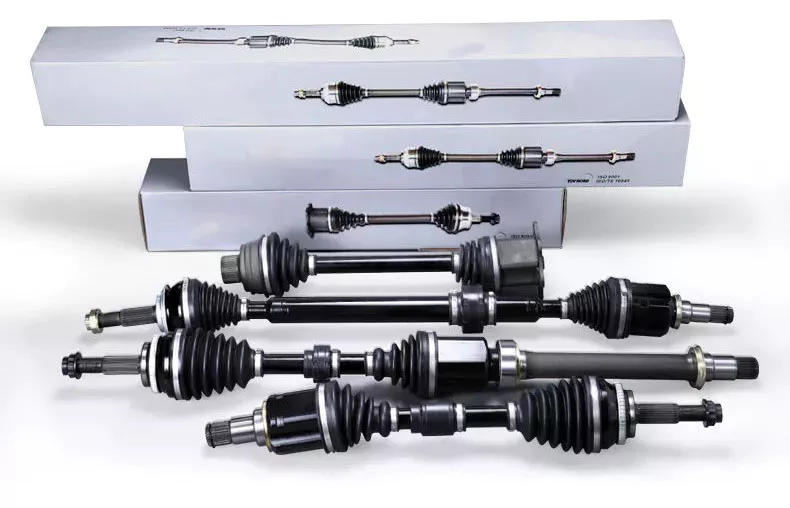
What maintenance practices are crucial for prolonging the lifespan of drive shafts?
To prolong the lifespan of drive shafts and ensure their optimal performance, several maintenance practices are crucial. Regular maintenance helps identify and address potential issues before they escalate, reduces wear and tear, and ensures the drive shaft operates smoothly and efficiently. Here are some essential maintenance practices for prolonging the lifespan of drive shafts:
1. Regular Inspection:
Performing regular inspections is vital for detecting any signs of wear, damage, or misalignment. Inspect the drive shaft visually, looking for cracks, dents, or any signs of excessive wear on the shaft itself and its associated components such as joints, yokes, and splines. Check for any signs of lubrication leaks or contamination. Additionally, inspect the fasteners and mounting points to ensure they are secure. Early detection of any issues allows for timely repairs or replacements, preventing further damage to the drive shaft.
2. Lubrication:
Proper lubrication is essential for the smooth operation and longevity of drive shafts. Lubricate the joints, such as universal joints or constant velocity joints, as recommended by the manufacturer. Lubrication reduces friction, minimizes wear, and helps dissipate heat generated during operation. Use the appropriate lubricant specified for the specific drive shaft and application, considering factors such as temperature, load, and operating conditions. Regularly check the lubrication levels and replenish as necessary to ensure optimal performance and prevent premature failure.
3. Balancing and Alignment:
Maintaining proper balancing and alignment is crucial for the lifespan of drive shafts. Imbalances or misalignments can lead to vibrations, accelerated wear, and potential failure. If vibrations or unusual noises are detected during operation, it is important to address them promptly. Perform balancing procedures as necessary, including dynamic balancing, to ensure even weight distribution along the drive shaft. Additionally, verify that the drive shaft is correctly aligned with the engine or power source and the driven components. Misalignment can cause excessive stress on the drive shaft, leading to premature failure.
4. Protective Coatings:
Applying protective coatings can help prolong the lifespan of drive shafts, particularly in applications exposed to harsh environments or corrosive substances. Consider using coatings such as zinc plating, powder coating, or specialized corrosion-resistant coatings to enhance the drive shaft’s resistance to corrosion, rust, and chemical damage. Regularly inspect the coating for any signs of degradation or damage, and reapply or repair as necessary to maintain the protective barrier.
5. Torque and Fastener Checks:
Ensure that the drive shaft’s fasteners, such as bolts, nuts, or clamps, are properly torqued and secured according to the manufacturer’s specifications. Loose or improperly tightened fasteners can lead to excessive vibrations, misalignment, or even detachment of the drive shaft. Periodically check and retighten the fasteners as recommended or after any maintenance or repair procedures. Additionally, monitor the torque levels during operation to ensure they remain within the specified range, as excessive torque can strain the drive shaft and lead to premature failure.
6. Environmental Protection:
Protecting the drive shaft from environmental factors can significantly extend its lifespan. In applications exposed to extreme temperatures, moisture, chemicals, or abrasive substances, take appropriate measures to shield the drive shaft. This may include using protective covers, seals, or guards to prevent contaminants from entering and causing damage. Regular cleaning of the drive shaft, especially in dirty or corrosive environments, can also help remove debris and prevent buildup that could compromise its performance and longevity.
7. Manufacturer Guidelines:
Follow the manufacturer’s guidelines and recommendations for maintenance practices specific to the drive shaft model and application. The manufacturer’s instructions may include specific intervals for inspections, lubrication, balancing, or other maintenance tasks. Adhering to these guidelines ensures that the drive shaft is properly maintained and serviced, maximizing its lifespan and minimizing the risk of unexpected failures.
By implementing these maintenance practices, drive shafts can operate reliably, maintain efficient power transmission, and have an extended service life, ultimately reducing downtime and ensuring optimal performance in various applications.

How do drive shafts contribute to the efficiency of vehicle propulsion and power transmission?
Drive shafts play a crucial role in the efficiency of vehicle propulsion and power transmission systems. They are responsible for transferring power from the engine or power source to the wheels or driven components. Here’s a detailed explanation of how drive shafts contribute to the efficiency of vehicle propulsion and power transmission:
1. Power Transfer:
Drive shafts transmit power from the engine or power source to the wheels or driven components. By efficiently transferring rotational energy, drive shafts enable the vehicle to move forward or drive the machinery. The design and construction of drive shafts ensure minimal power loss during the transfer process, maximizing the efficiency of power transmission.
2. Torque Conversion:
Drive shafts can convert torque from the engine or power source to the wheels or driven components. Torque conversion is necessary to match the power characteristics of the engine with the requirements of the vehicle or machinery. Drive shafts with appropriate torque conversion capabilities ensure that the power delivered to the wheels is optimized for efficient propulsion and performance.
3. Constant Velocity (CV) Joints:
Many drive shafts incorporate Constant Velocity (CV) joints, which help maintain a constant speed and efficient power transmission, even when the driving and driven components are at different angles. CV joints allow for smooth power transfer and minimize vibration or power losses that may occur due to changing operating angles. By maintaining constant velocity, drive shafts contribute to efficient power transmission and improved overall vehicle performance.
4. Lightweight Construction:
Efficient drive shafts are often designed with lightweight materials, such as aluminum or composite materials. Lightweight construction reduces the rotational mass of the drive shaft, which results in lower inertia and improved efficiency. Reduced rotational mass enables the engine to accelerate and decelerate more quickly, allowing for better fuel efficiency and overall vehicle performance.
5. Minimized Friction:
Efficient drive shafts are engineered to minimize frictional losses during power transmission. They incorporate features such as high-quality bearings, low-friction seals, and proper lubrication to reduce energy losses caused by friction. By minimizing friction, drive shafts enhance power transmission efficiency and maximize the available power for propulsion or operating other machinery.
6. Balanced and Vibration-Free Operation:
Drive shafts undergo dynamic balancing during the manufacturing process to ensure smooth and vibration-free operation. Imbalances in the drive shaft can lead to power losses, increased wear, and vibrations that reduce overall efficiency. By balancing the drive shaft, it can spin evenly, minimizing vibrations and optimizing power transmission efficiency.
7. Maintenance and Regular Inspection:
Proper maintenance and regular inspection of drive shafts are essential for maintaining their efficiency. Regular lubrication, inspection of joints and components, and prompt repair or replacement of worn or damaged parts help ensure optimal power transmission efficiency. Well-maintained drive shafts operate with minimal friction, reduced power losses, and improved overall efficiency.
8. Integration with Efficient Transmission Systems:
Drive shafts work in conjunction with efficient transmission systems, such as manual, automatic, or continuously variable transmissions. These transmissions help optimize power delivery and gear ratios based on driving conditions and vehicle speed. By integrating with efficient transmission systems, drive shafts contribute to the overall efficiency of the vehicle propulsion and power transmission system.
9. Aerodynamic Considerations:
In some cases, drive shafts are designed with aerodynamic considerations in mind. Streamlined drive shafts, often used in high-performance or electric vehicles, minimize drag and air resistance to improve overall vehicle efficiency. By reducing aerodynamic drag, drive shafts contribute to the efficient propulsion and power transmission of the vehicle.
10. Optimized Length and Design:
Drive shafts are designed to have optimal lengths and designs to minimize energy losses. Excessive drive shaft length or improper design can introduce additional rotational mass, increase bending stresses, and result in energy losses. By optimizing the length and design, drive shafts maximize power transmission efficiency and contribute to improved overall vehicle efficiency.
Overall, drive shafts contribute to the efficiency of vehicle propulsion and power transmission through effective power transfer, torque conversion, utilization of CV joints, lightweight construction, minimized friction, balanced operation, regular maintenance, integration with efficient transmission systems, aerodynamic considerations, and optimized length and design. By ensuring efficient power delivery and minimizing energy losses, drive shafts play a significant role in enhancing the overall efficiency and performance of vehicles and machinery.

How do drive shafts contribute to transferring rotational power in various applications?
Drive shafts play a crucial role in transferring rotational power from the engine or power source to the wheels or driven components in various applications. Whether it’s in vehicles or machinery, drive shafts enable efficient power transmission and facilitate the functioning of different systems. Here’s a detailed explanation of how drive shafts contribute to transferring rotational power:
1. Vehicle Applications:
In vehicles, drive shafts are responsible for transmitting rotational power from the engine to the wheels, enabling the vehicle to move. The drive shaft connects the gearbox or transmission output shaft to the differential, which further distributes the power to the wheels. As the engine generates torque, it is transferred through the drive shaft to the wheels, propelling the vehicle forward. This power transfer allows the vehicle to accelerate, maintain speed, and overcome resistance, such as friction and inclines.
2. Machinery Applications:
In machinery, drive shafts are utilized to transfer rotational power from the engine or motor to various driven components. For example, in industrial machinery, drive shafts may be used to transmit power to pumps, generators, conveyors, or other mechanical systems. In agricultural machinery, drive shafts are commonly employed to connect the power source to equipment such as harvesters, balers, or irrigation systems. Drive shafts enable these machines to perform their intended functions by delivering rotational power to the necessary components.
3. Power Transmission:
Drive shafts are designed to transmit rotational power efficiently and reliably. They are capable of transferring substantial amounts of torque from the engine to the wheels or driven components. The torque generated by the engine is transmitted through the drive shaft without significant power losses. By maintaining a rigid connection between the engine and the driven components, drive shafts ensure that the power produced by the engine is effectively utilized in performing useful work.
4. Flexible Coupling:
One of the key functions of drive shafts is to provide a flexible coupling between the engine/transmission and the wheels or driven components. This flexibility allows the drive shaft to accommodate angular movement and compensate for misalignment between the engine and the driven system. In vehicles, as the suspension system moves or the wheels encounter uneven terrain, the drive shaft adjusts its length and angle to maintain a constant power transfer. This flexibility helps prevent excessive stress on the drivetrain components and ensures smooth power transmission.
5. Torque and Speed Transmission:
Drive shafts are responsible for transmitting both torque and rotational speed. Torque is the rotational force generated by the engine or power source, while rotational speed is the number of revolutions per minute (RPM). Drive shafts must be capable of handling the torque requirements of the application without excessive twisting or bending. Additionally, they need to maintain the desired rotational speed to ensure the proper functioning of the driven components. Proper design, material selection, and balancing of the drive shafts contribute to efficient torque and speed transmission.
6. Length and Balance:
The length and balance of drive shafts are critical factors in their performance. The length of the drive shaft is determined by the distance between the engine or power source and the driven components. It should be appropriately sized to avoid excessive vibrations or bending. Drive shafts are carefully balanced to minimize vibrations and rotational imbalances, which can affect the overall performance, comfort, and longevity of the drivetrain system.
7. Safety and Maintenance:
Drive shafts require proper safety measures and regular maintenance. In vehicles, drive shafts are often enclosed within a protective tube or housing to prevent contact with moving parts, reducing the risk of injury. Safety shields or guards may also be installed around exposed drive shafts in machinery to protect operators from potential hazards. Regular maintenance includes inspecting the drive shaft for wear, damage, or misalignment, and ensuring proper lubrication of the U-joints. These measures help prevent failures, ensure optimal performance, and extend the service life of the drive shaft.
In summary, drive shafts play a vital role in transferring rotational power in various applications. Whether in vehicles or machinery, drive shafts enable efficient power transmission from the engine or power source to the wheels or driven components. They provide a flexible coupling, handle torque and speed transmission, accommodate angular movement, and contribute to the safety and maintenance of the system. By effectively transferring rotational power, drive shafts facilitate the functioning and performance of vehicles and machinery in numerous industries.


editor by CX 2023-09-13
China Gjf Brand Left Side Rear Drive Shaft Axle Car for Daewoo 1.6 CV Joint Front Op-1-006 electric axle
Product Description
Product Description
1.We are manufacturer of cv drive shaft,cv axle, cv joint and cv boot, we have more than 20-years experience in producing and selling auto parts.
2.We have strict quality control, the quality of our products is very good.
3.We are professional in different market around the world.
4.The reviews our customers given us are very positive, we have confidence in our products.
5.OEM/ODM is available, meet your requirements well.
6.Large warehouse, huge stocks!!! friendly for those customers who want some quantity.
7.Ship products out very fastly, we have stock.
| Product Name | CV JOINT | Material | 42CrMo alloy steel |
| Car fitment | DAEWOO | Warranty | 12 months |
| Model | DAEWOO 1.6 | Place of origin | ZHangZhoug, China |
| Certification | SGS/TUV/ISO | MOQ | 4 PCS |
| Transportation | Express/ by sea/ by air/ by land | Delivery time | 1-7 days |
| OEM/ODM | Yes | Brand | GJF |
| Advantages | large stocks/ deliver fastly/ strict quality supervision | Payment | L/C,T/T,western Union,Cash,PayPal |
| Sample service | Depends on the situation of stock | Weight | 2-3 KG |
Detailed Photos
Customer Review
Packaging & Shipping
FAQ
|
US $10.32-30 / Piece | |
10 Pieces (Min. Order) |
###
| After-sales Service: | 12 Months |
|---|---|
| Condition: | New |
| Color: | Black |
| Certification: | CE, DIN, ISO |
| Type: | C.V. Joint |
| Application Brand: | Daewoo |
###
| Samples: |
US$ 10.32/Piece
1 Piece(Min.Order) |
|---|
###
| Customization: |
Available
|
|---|
###
| Product Name | CV JOINT | Material | 42CrMo alloy steel |
| Car fitment | DAEWOO | Warranty | 12 months |
| Model | DAEWOO 1.6 | Place of origin | Zhejiang, China |
| Certification | SGS/TUV/ISO | MOQ | 4 PCS |
| Transportation | Express/ by sea/ by air/ by land | Delivery time | 1-7 days |
| OEM/ODM | Yes | Brand | GJF |
| Advantages | large stocks/ deliver fastly/ strict quality supervision | Payment | L/C,T/T,western Union,Cash,PayPal |
| Sample service | Depends on the situation of stock | Weight | 2-3 KG |
|
US $10.32-30 / Piece | |
10 Pieces (Min. Order) |
###
| After-sales Service: | 12 Months |
|---|---|
| Condition: | New |
| Color: | Black |
| Certification: | CE, DIN, ISO |
| Type: | C.V. Joint |
| Application Brand: | Daewoo |
###
| Samples: |
US$ 10.32/Piece
1 Piece(Min.Order) |
|---|
###
| Customization: |
Available
|
|---|
###
| Product Name | CV JOINT | Material | 42CrMo alloy steel |
| Car fitment | DAEWOO | Warranty | 12 months |
| Model | DAEWOO 1.6 | Place of origin | Zhejiang, China |
| Certification | SGS/TUV/ISO | MOQ | 4 PCS |
| Transportation | Express/ by sea/ by air/ by land | Delivery time | 1-7 days |
| OEM/ODM | Yes | Brand | GJF |
| Advantages | large stocks/ deliver fastly/ strict quality supervision | Payment | L/C,T/T,western Union,Cash,PayPal |
| Sample service | Depends on the situation of stock | Weight | 2-3 KG |
An Axle is a Simple Machine For Amplifying Force
An axle is the central shaft that connects the drive wheels of a vehicle. It transmits power from the engine to the wheels and absorbs braking and acceleration forces. It may also contain bearings. Learn more about the important functions of the axle in your vehicle. Its simple design makes it an efficient machine for amplifying force.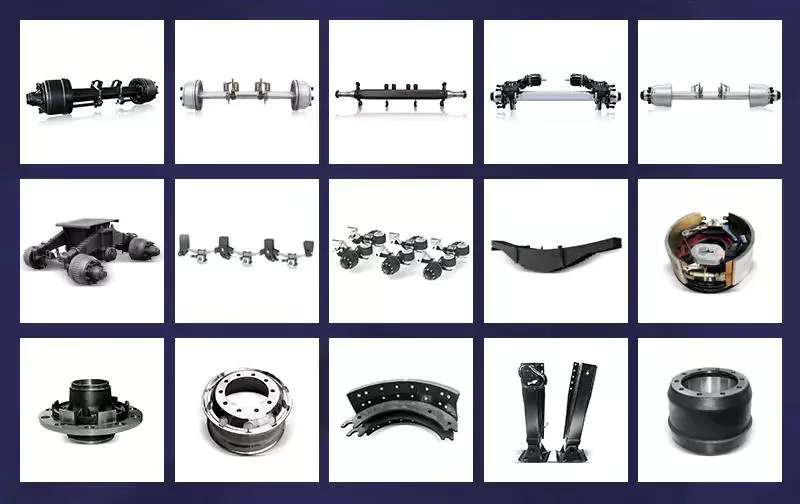
An axle is a rod or shaft that connects to the drive wheels
An axle is a rod or shaft that is fixed to the drive wheels of a vehicle. It provides support and rotates with the wheels. Generally, a vehicle has two axles. However, larger vehicles can have more. The type of axle used will depend on how much torque and speed the wheels need to travel.
Drive axles are crucial to the operation of a car. They transfer power from the engine to the wheels, so they must be strong and durable. They also need to be able to support the weight of the vehicle and resist accelerated forces. The drive axle is usually connected to a driveshaft, which extends upward into the transmission and connects with the engine.
There are two main types of axles: front wheel drive (FWD) and rear wheel drive (RWD). The former type is common in passenger vehicles, while the latter type is more common for trucks and cars. The rear wheel drive (RWD) axle connects to the drive wheels, while the front-wheel drive (FWD) axle transfers power from the transaxle differential to the wheels.
Modern drive axles consist of short rods with a flexible rubber boot covering the CV joint. The rubber boot helps to prevent dirt and grease from getting into the CV joint. The increased complexity of the drive axle increases the risk that something goes wrong with it. However, this increases the car’s traction, ride quality, and handling.
A car’s axles are designed by engineers to be extremely strong. They must be able to withstand thousands of pounds of weight, while operating under high levels of friction. But no drive axle is invincible; they will break if the vehicle is overloaded or too heavy.
The rear axle is connected to the engine and rotates with the wheels. The front axle helps with steering and absorbs road shocks. Typically, this part is made of carbon steel and nickel steel.
It absorbs braking and acceleration forces
The Axle is an important part of a vehicle’s suspension. It is responsible for absorbing braking and acceleration forces. Axle roll centres are located on the transversal vertical plane, through the center of each wheel. This is the point at which lateral force applied to the sprung mass is transferred to the unsprung mass, a process known as transfer of momentum. This force coupling point is also known as the Neutral Roll Axis.
An axle’s role in a vehicle goes beyond absorbing braking and acceleration forces. It also serves as a weight transfer device, reducing the stress on the joints of a vehicle. Its design has evolved over time to meet a variety of requirements. It must be durable and able to absorb braking and acceleration forces, while providing the right amount of structural support.
A potential diagram can be used to benchmark tyre performance. The data entered can include suspension geometry and load distributions. The lateral force potential of a tyre is calculated for each individual tyre in an axle, and the values obtained for a constant steer angle are also included.
Optimal energy recovery is crucial for absorbing braking forces and meeting the total braking force required for a given deceleration. Figure 11 shows the braking forces for the front and rear axles over a certain range when j/g = m. The thick solid line ab represents this range.
In addition to braking and acceleration forces, an axle’s lateral force capacity is limited by lateral load transfer. If one axle fails to absorb lateral forces, it might break loose and skid before the other. This can lead to understeer and oversteer. This is why it is not a good idea to put unsprung weight on a vehicle’s axle.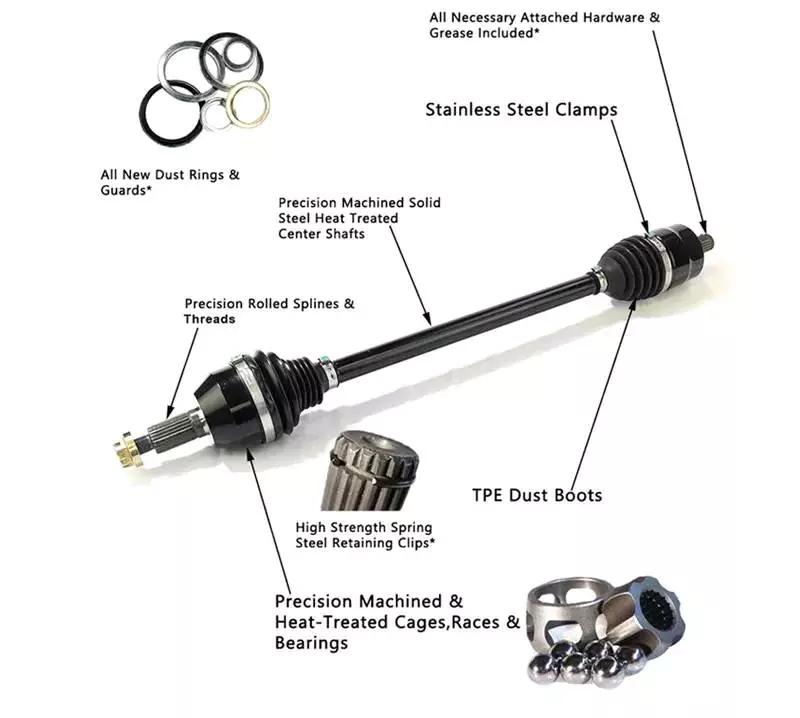
It transmits power from the engine to the wheels
The axle is an integral part of a vehicle’s drive system. It transmits power from the engine to the wheels. Different types of axles have different roles in transmission of power from the engine to the wheels. The drive shaft is the main component of an axle, connecting the engine and the wheels.
A vehicle’s axle transmits power from the engine to the rear wheels. The power is transferred through the gears to move the car forward. The inner wheel of a bicycle pedal powers the back wheel, while the outer wheel moves at a different speed. Similarly, the power from the engine is transmitted to the wheels by a car’s crankshaft and driveshaft.
The type of axle you choose depends on the size of the vehicle and its purpose. Standard axles are suitable for most vehicles, while customized axles are best suited for high-performance vehicles. Customized axles give you more control over the wheel speed and torque. It’s important to know about the types and sizes of axles to choose the right one for your vehicle.
A differential is another vital component of the drivetrain. It allows the power from the engine to reach both wheels, which allows the vehicle to accelerate and decelerate. A differential also compensates for the difference in tyre speeds on curved roads. By using a differential, you can increase the speed of the wheels and improve your car’s handling.
The differential between the front and rear axles is called a bevel ring gear. Its input shaft is supported by a ball race mounted in the axle casing. The other part of the differential is called the input helical gear. The two sun gears are connected by cross-pins.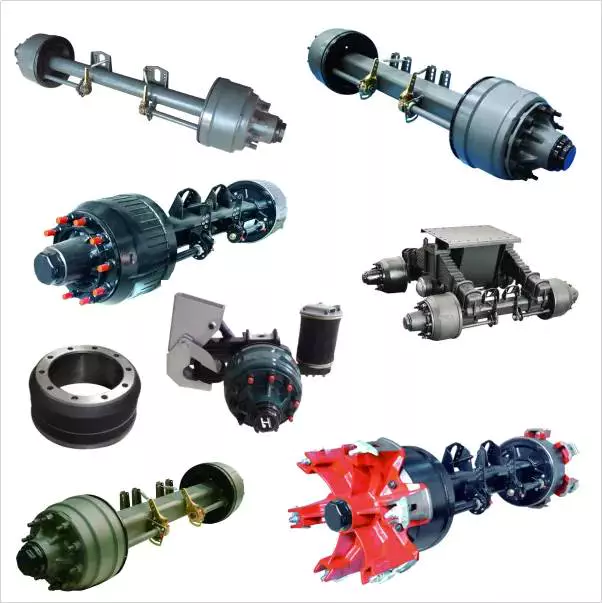
It is a simple machine for amplifying force
A simple machine is one that increases the output of force without altering the input force. For example, a lever increases force but does not create new energy. Therefore, it is necessary to balance the work input and output. It is important to keep in mind that friction can reduce energy.
Using a simple machine, you can perform various tasks. For example, you can use it to cut and pry apart objects. This type of machine involves a wheel and an axle, which have a smaller radius than the wedge. The force applied by the wheel pushes the two pieces apart.
Another simple machine that amplifies force is a gearbox. The earliest gearboxes were used to lift buckets or weights from wells. The large gear is attached to a smaller one by a hinge. The smaller gear increases the force of the larger one, allowing the small gear to lift much larger loads.
A wheel and axle is a simple machine that uses mechanical advantage to change force. A wheel is a circular disk, and an axle is a rod through the center. The mechanical advantage is a result of the combination of torque and angular momentum to work against the force of gravity. In addition, this machine is closely related to gears.
Simple machines are a great way to compare the magnitude of forces, as they use similar mechanisms. One of the oldest examples of a simple machine is a wheel and axle. A wheel is fixed to an axle, and the axle is fixed to a vertical surface. The force generated by the wheel will be proportional to the distance between the two spools.
Another simple machine that amplifies force is a lever. A lever uses a beam or a rigid rod that can pivot on its fulcrum. It is an effective tool for shifting heavy loads, and also for applying force. It also reduces the friction of a vehicle while preserving its momentum.

editor by czh 2022-12-02
China high quality High Quality Wholesale Price Auto Oem Parts Car Axle Left Drive Shaft For Universal Car with high quality
CNC Machining or Not: Cnc Machining
Kind: Etching / Chemical Machining, Other Machining Solutions, Fast Prototyping
Materials Capabilities: Aluminum, Brass, Bronze, Copper, Hardened Metals, Valuable Metals, Stainless Metal, Metal Alloys
Micro Machining or Not: Micro Machining
Model Amount: Vehicle Axle
Packaging Details: PALLET
Port: ZheJiang PORT
Merchandise Description
Applicable Industries
Manufacturing Plant
Soon after Guarantee Support
Video technical help, On-line assist, Spare elements
Problem
New
Location of Origin
China
Firm Profile HangZhou Yao Yao Equipment Manufacturing Co., Ltd. is a professional manufacturer who focusing on forging and rolling rings.We have 4 wonderful generation strains: 4 sets of temperatures-controlled electric furnaces,a few sets of shut single point presses, 1 established of oil push and 1 established of a single- ton air hammer, as effectively as 3 vertical ring mills and 1 set of numerical management ring mill.The annual capability of forgings is 6000-8000 tons, plastic nylon health club pulley with bearing OD 3.5 inch 90mm gym pulley, shaft dimension 10mm and the processing assortment of merchandise dimension is one hundred-600mm.Our merchandise are largely categorized as: ring gear forgings, flange forgings, slewing bearings and many others., which are commonly employed in auto parts, building machinery, solar energy era and other fields.For a long time, our firm supplies expert supporting processing enterprise for Changchai, CZPT engine, Dana, sinotruk, Hyundai, Caterpillar hydraulic cylinder, Huafang, Kaimai new strength and other effectively-acknowledged brand names at house and overseas.Our company has passed the ISO9001:2015 high quality management program certification, in line with the “top quality builds manufacturer, integrity wins the long term” business philosophy, Rapidly Production Large Good quality KC Type Spline Shaft Couplings Roller Chain Coupling Rigid Shaft Coupling consider what buyers consider, urgent customers urgent, generate the most cost-powerful items and provide thoughtful and meticulous services.Your demand is our driving drive, your recognition is our objective, your praise is our pride!Sincerely welcome new and aged consumers at home and overseas to pay a visit to the advice, CZPT cooperation, develop a much better long term! Certifications Manufacturing Method Packing & Delivery FAQ one. What can I get the price tag?A We generally quotation inside 24 hours after we get your inquiry. If you are quite urgent to get the price tag, please notify us in your email so that we will regard you inquiry precedence. 2. What about the lead time for the mass manufacturing?A Actually, it is dependent on the purchase quantity and the time you area the buy. 3. Can I get a reduce price tag if I get large quantities?A Yes, less costly charges with a lot more greater quantity orders. ATVS Very good Promoting Vehiculo Todo Terreno 4X4 Utv And Aspect By All set Ship Quad Bicycle Grownup 4 X Qaud China Racing Atv Truck 4. Do you examine the concluded goods?Yes, every stage of creation and finished merchandise will be arrived out inspection by QC office just before shipping and delivery.
Various elements of the generate shaft
The driveshaft is the flexible rod that transmits torque among the transmission and the differential. The phrase drive shaft may possibly also refer to a cardan shaft, a transmission shaft or a propeller shaft. Parts of the drive shaft are diverse and include:
The driveshaft is a versatile rod that transmits torque from the transmission to the differential
When the driveshaft in your automobile starts off to are unsuccessful, you ought to find skilled support as shortly as attainable to fix the dilemma. A ruined driveshaft can often be heard. This sounds seems like “tak tak” and is generally much more pronounced for the duration of sharp turns. Even so, if you can not hear the sounds although driving, you can examine the situation of the vehicle your self.
The drive shaft is an critical component of the car transmission technique. It transfers torque from the transmission to the differential, which then transfers it to the wheels. The system is complicated, but nonetheless critical to the suitable performing of the automobile. It is the adaptable rod that connects all other areas of the drivetrain. The driveshaft is the most crucial component of the drivetrain, and comprehension its function will make it easier for you to appropriately maintain your car.
Driveshafts are employed in different vehicles, which includes entrance-wheel drive, 4-wheel push, and entrance-engine rear-wheel generate. Travel shafts are also employed in bikes, locomotives and ships. Widespread front-motor, rear-wheel push motor vehicle configurations are revealed beneath. The kind of tube employed depends on the dimension, speed and energy of the generate shaft.
The output shaft is also supported by the output hyperlink, which has two similar supports. The higher element of the generate module supports a big tapered roller bearing, although the reverse flange stop is supported by a parallel roller bearing. This ensures that the torque transfer in between the differentials is successful. If you want to discover far more about vehicle differentials, read through this article.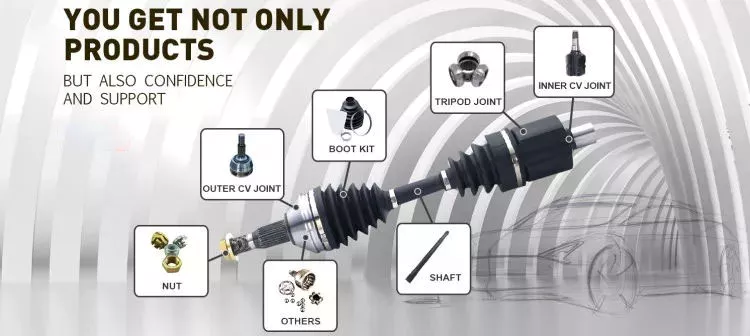
It is also recognized as cardan shaft, propeller shaft or generate shaft
A propshaft or propshaft is a mechanical element that transmits rotation or torque from an engine or transmission to the front or rear wheels of a vehicle. Since the axes are not directly connected to each other, it must permit relative motion. Simply because of its role in propelling the vehicle, it is critical to recognize the elements of the driveshaft. Listed here are some widespread sorts.
Isokinetic Joint: This variety of joint assures that the output velocity is the same as the input pace. To obtain this, it must be mounted back-to-back on a plane that bisects the drive angle. Then mount the two gimbal joints back-to-again and adjust their relative positions so that the velocity changes at 1 joint are offset by the other joint.
Driveshaft: The driveshaft is the transverse shaft that transmits electrical power to the entrance wheels. Driveshaft: The driveshaft connects the rear differential to the transmission. The shaft is component of a push shaft assembly that contains a drive shaft, a slip joint, and a universal joint. This shaft provides rotational torque to the generate shaft.
Dual Cardan Joints: This sort of driveshaft utilizes two cardan joints mounted back-to-back. The centre yoke replaces the intermediate shaft. For the duplex universal joint to perform correctly, the angle among the enter shaft and the output shaft should be equivalent. When aligned, the two axes will operate as CV joints. An improved variation of the dual gimbal is the Thompson coupling, which provides a bit much more effectiveness at the value of extra complexity.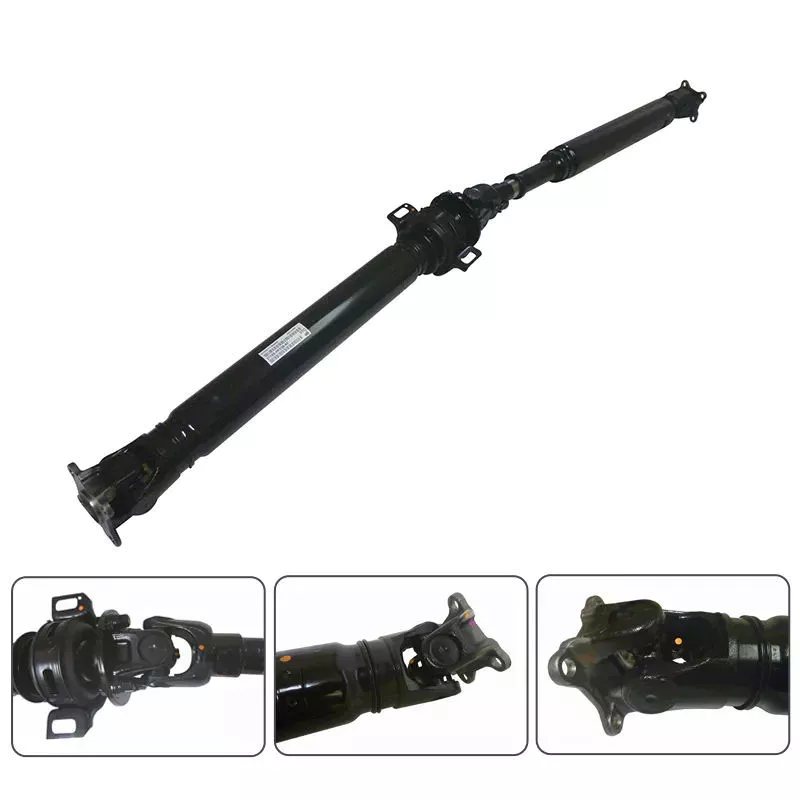
It transmits torque at various angles among driveline factors
A vehicle’s driveline consists of various elements that transmit power from the engine to the wheels. This involves axles, propshafts, CV joints and differentials. Jointly, these components transmit torque at distinct angles between driveline factors. A car’s powertrain can only purpose effectively if all its factors function in harmony. Without having these elements, electricity from the motor would end at the transmission, which is not the case with a vehicle.
The CV driveshaft design and style offers smoother procedure at larger functioning angles and extends differential and transfer scenario daily life. The assembly’s central pivot level intersects the joint angle and transmits easy rotational energy and surface pace by way of the drivetrain. In some instances, the C.V. “U” connector. Travel shafts are not the greatest selection since the joint angles of the “U” joints are often substantially unequal and can cause torsional vibration.
Driveshafts also have diverse names, which includes driveshafts. A car’s driveshaft transfers torque from the transmission to the differential, which is then distributed to other driveline components. A electrical power consider-off (PTO) shaft is related to a prop shaft. They transmit mechanical power to linked elements. They are crucial to the efficiency of any auto. If any of these factors are destroyed, the total drivetrain will not operate properly.
A car’s powertrain can be complex and difficult to maintain. Introducing vibration to the drivetrain can trigger untimely wear and shorten total lifestyle. This driveshaft idea focuses on driveshaft assembly, procedure, and servicing, and how to troubleshoot any troubles that could crop up. Adding suitable options to soreness points can lengthen the lifestyle of the driveshaft. If you are in the market for a new or employed car, be sure to read this write-up.
it is made up of several parts
“It is made up of numerous components” is 1 of 7 little prints. This word is made up of 10 letters and is a single of the toughest words to say. However, it can be described simply by comparing it to a cow’s kidney. The cocoa bean has several parts, and the inside of of the cocoa bean before bursting has distinctive strains. This article will talk about the distinct areas of the cocoa bean and offer a entertaining way to find out a lot more about the word.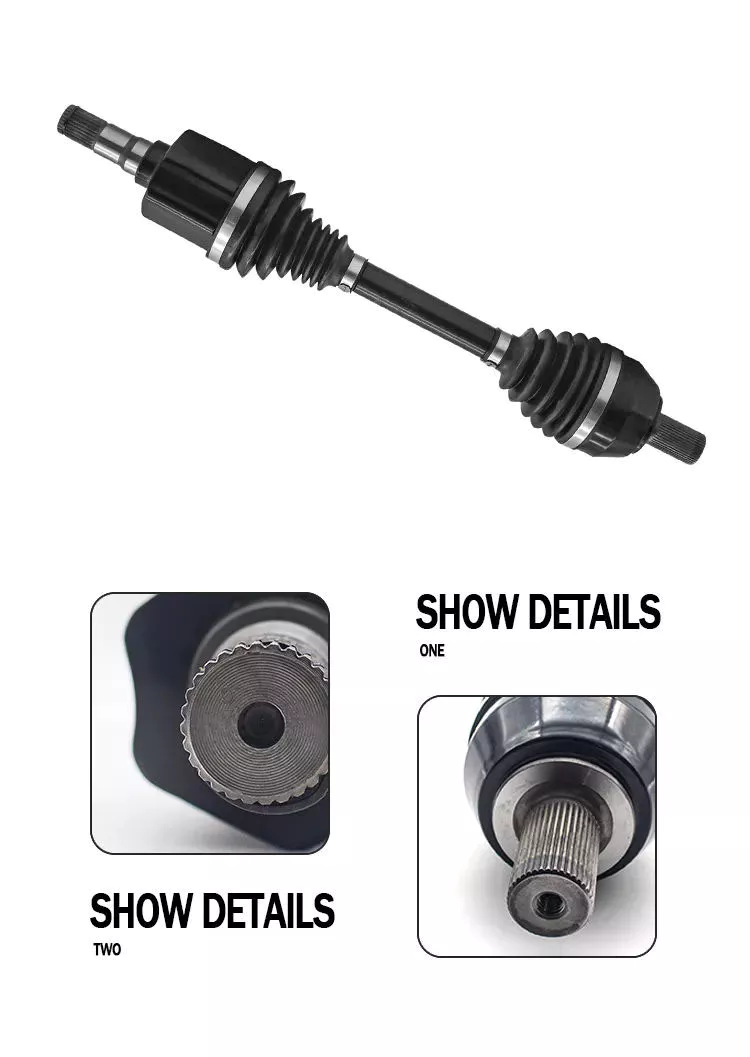
Substitution is high-priced
Replacing a car’s driveshaft can be an costly affair, and it is not the only portion that wants servicing. A destroyed push shaft can also result in other issues. This is why obtaining estimates from diverse mend shops is vital. Usually, a simple mend is less expensive than changing the total unit. Listed under are some suggestions for saving money when replacing a driveshaft. Listed underneath are some of the charges linked with repairs:
Very first, find out how to establish if your motor vehicle requirements a driveshaft substitute. Damaged driveshaft elements can result in intermittent or absence of power. Moreover, improperly put in or assembled driveshaft components can trigger issues with the daily operation of the vehicle. Anytime you suspect that your automobile wants a driveshaft repair, find skilled guidance. A expert mechanic will have the understanding and knowledge essential to properly resolve the dilemma.
2nd, know which elements require servicing. Check the u-joint bushing. They ought to be totally free of crumbs and not cracked. Also, examine the middle assistance bearing. If this portion is destroyed, the entire push shaft wants to be changed. Finally, know which parts to exchange. The upkeep value of the push shaft is substantially lower than the maintenance cost. Last but not least, figure out if the fixed driveshaft is suitable for your vehicle.
If you suspect your driveshaft wants provider, make an appointment with a restore shop as shortly as achievable. If you are going through vibration and rough driving, driveshaft repairs may be the best way to prevent expensive repairs in the potential. Also, if your car is going through unusual sound and vibration, a driveshaft mend may possibly be a fast and effortless solution. If you will not know how to diagnose a difficulty with your auto, you can take it to a mechanic for an appointment and a estimate.

